It was Yahweh who drew all the people to the House of Yahweh to Abilene, Texas and it was Yisrayl Hawkins in his fleshly, lustful, carnal psychotic mind, who destroyed families, friendships, bodies, souls, and minds. Yahweh says that He doesn’t hold the people responsible, but the Shepherds who lead the flock! Had those who attended the House of Yahweh been guided to the Great Shepherd’s teachings, by Yisrayl Hawkins, today many men and women would still be there as ONE BIG RELIGIOUS FAMILY.
This link reveals the pattern of a man of sin, an example of a son of perdition who fits the description of a scripture written by the Apostle Shaul, who revealed the details of a son of perdition, which can be found in the book of II Thessalonians 2nd chapter.
Bible passage mistranslation is something that Yisrayl Hawkins utilizes effectively to deceive the masses who inquire of his church teachings! He boasts that his version of the Bible called, “The Book of Yahweh,” is the best English translation on the market today! He even goes further to state that, “Bible Scholars agree that his version of the Bible is the best English version available today”! However, we have not found any SCHOLARS to back up this claim! In fact, we have repeatedly asked Yisrayl Hawkins, and his organization, to provide us with two accredited Bible Scholars or two accredited Bible Schools/University testimonials, to back up his claim about his version of the bible being the best on the market today! So far as of September 1, 2013 we have not received anything to back up this claim about his version of the bible!
What we have found is Yisrayl Hawkins has committed the biggest religious fraud campaign to ever be devised by a religious leader in modern times! After all, if you can change the bible to fit the doctrines of your church, by creating revised doctrinal passages, through careful and skilled personal religious interpretation and translation, then you can essentially control every aspect of peoples religious and personal life! This author can testify that Yisrayl Hawkins has deceived many bible students this his version of the bible and has accomplished his goal!
By using his “Book of Yahweh” as a source of bible interpretation for those who come to his church, he has accomplished what he has set out to do with it’s usage–“Deceive thousands of people!” I have seen people throw away their bibles and use only his “Book of Yahweh,” as a source of scriptural reference. Of course all of these people have elementary biblical hebrew skills in their usage of basic bible study books such as, Strong’s Concordance, or Hebrew/English Lexicons. Most never verify what he interprets in his bible, and rely solely in trusting Yisrayl Hawkins interpretation! This is to their detriment! To make matters worse, they then brag about being the wisest people on the planet, when it comes to bible interpretation and translation. But I assure you they wouldn’t last one minute with a skilled bible scholar, or even someone who knows how to correctly use the bible study books available!
Here is a great review of his translation called “the Book of Yahweh” on Amazon.com!
http://www.amazon.com/The-Book-Yahweh-House/dp/189096722X
I couldn’t have written a better review! Mr. Ehav Eliyahu Ever, nailed it down solid!
Mistranslations of scripture by Buffalo Bill Yisrayl Hawkins which he uses to deceive the people who enter his organization.
BELOW IS A THOROUGH SCRIPTURAL EXAMINATION OF A FEW OF YISRAYL HAWKINS SCRIPTURAL MISTRANSLATIONS THAT IS TAUGHT AT HIS CHURCH AND PLACED INTO HIS VERSION OF THE BIBLE CALLED “THE BOOK OF YAHWEH.” WE DISPROVE YISRAYL HAWKINS INTERPRETATION OF BIBLE PASSAGES, WITH REPUTABLE HEBREW LEXICONS, CONCORDANCES, AND USE FACTUAL INFORMATION, TO EXPOSE YISRAYL HAWKINS DECEPTIVE MISUSE OF SCHOLARLY BOOKS THROUGH HIS BRAND OF SCRIPTURAL INTERPRETATION.
WE HAVE FOUND THAT HE USES HIS BIBLE TO INTENTIONALLY DECEIVE PEOPLE! WE PROVIDE OUR RESEARCH AS A SERVICE TO THE READER, IN ORDER TO SHOW THE PROPER TRANSLATION, BASED ON THE HEBREW LANGUAGE AND TO GIVE THE AVERAGE BIBLE STUDENT AN ADVANTAGE OVER YISRAYL HAWKINS BRAND OF UNEDUCATED BIBLE INTERPRETATION!
YOU WILL OBSERVE FROM OUR RESEARCH HOW HE MISTRANSLATES, INTENTIONALLY, THE HOLY SCRIPTURES WHICH CAUSES THE UNSUSPECTING BIBLE STUDENT, AND THE RELIGIOUSLY UNEDUCATED MEMBERS OF HIS CHURCH TO FALL INTO RELIGIOUS DECEPTION! WE SAY INTENTIONALLY BECAUSE WE HAVE POINTED OUT THEIR ERROR AND THEY HAVE NOT CORRECTED IT!
WE ENCOURAGE ANYONE TO DISPROVE OUR RESEARCH BASED ON REPUTABLE SCHOLARLY BACKING. IF IT IS FOUND TO BE INCORRECT WE WILL CORRECT IT!
Review of Exodus 15:3 written by Yisrayl Hawkins, of a House of Yahweh, Clyde, Texas:
by Kepha Arcemont
I had started to write a much harsher review of this translation when I decided to find out what I could about the author.
From
research online about Yisrayl Hawkins, his life history is somewhat unusual for anyone to credibly take as a serious Hebrew translation scholar. His credentials include being a former rockabilly singer, ex-cop, trailer park owner, holds the title of Doctor (no verification where he got his doctorate or what it is in), and now pastor, of a House of Yahweh located in Abilene, Texas. However, it is apparent by his translation of Exodus 15:3, his utter lack of familiarity with the Hebrew language, linguistics, grammar, and no sound research methodology. Most importantly he has no formal schooling in these subjects, which leaves him unprepared for writing even the most basic sort of study on the translation of biblical Hebrew.
HOW TO RECOGNIZE MISTRANSLATIONS
In the August, 2012, issue of PW Magazine that is issued every month by Yisrayl Hawkins we have a fine example of blatant mistranslation of the scriptures. This magazine can be
viewed online at:
http://www.yahweh.com/htmls/8-2012-PW/Introduction.html
Look under the heading: Understanding The Prophecy of the White Buffalo, then go to the sub-heading: The One Man Who Would Bear Witness In These Last Days Would Be Hidden.
If you have an actual printed hard copy we will look on page 11, under the same heading as is available online.
We will be examining Exodus 15:3 and we will reveal the mistranslation colored in red and as shown by Yisrayl Hawkins. In the magazine they write and print the following information:
The Prophetic Word, August 2012, page 11 bottom right hand column:
Yahshua Messiah was saying that in these Last Days (Mattithyah 24:3), a man would come bearing witness of the Kingdom of Yahweh, establishing through his witness that Perfect Government based upon Perfect Laws that Daniyl spoke about.
The Patriarch Mosheh was one of the first to be moved to reveal the name of this man who would bear witness of this Perfect Government based upon Perfect Laws in these Last Days. He was actually moved by Yahweh to reveal this man’s name in Yahweh’s Laws.
.Exodus 15:3—
Yahweh is a man of war; Yahweh is His Name.
man of war meaning one man Yisrayl, one servant Yisrayl, knowledge of the Law (of Yahweh)
— Hebrew words ayish malachmah; ayish is listed on page 44 of Gesenius’ Hebrew and Chaldee Lexicon by Edward Robinson; malachmah is listed on page 789 of Volume 1 of the Hebrew-Aramaic-English Dictionary by Marcus Jastrow.
This Scripture is actually saying:
.Exodus 15:3—
For from one man, Yahweh’s Servant Yisrayl, will come Knowledge of the Laws of Yahweh and His Name.
We will point out the following discrepancies in Mr. Hawkins usage of Hebrew
Lexicon,s which he used in this translation of Exodus 15:3:
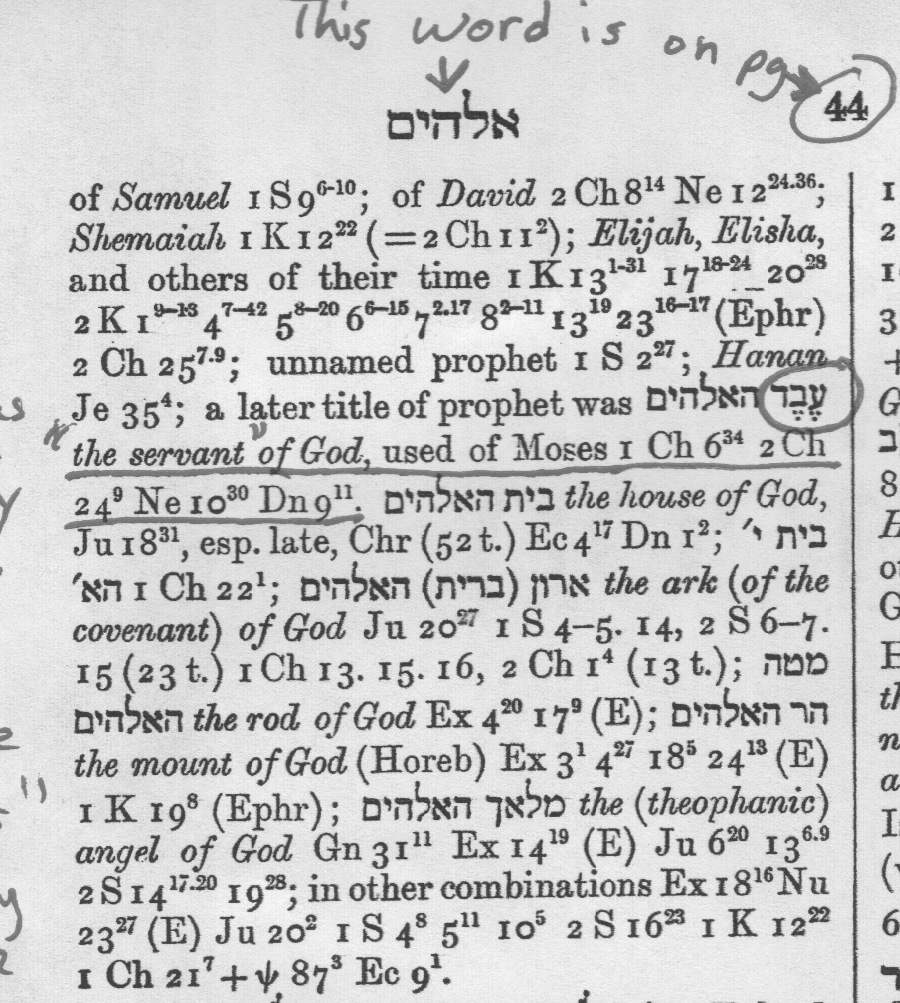
Notice that the word on page 44 is not, ayish, but is: elohim! Notice that Moses is called an Elohim of Yahweh! So maybe they got the wrong page number? Let’s find the word ayish on the correct page of this Lexicon, which would be page 35,36! This would be the right page, with the right word, and the right scripture!
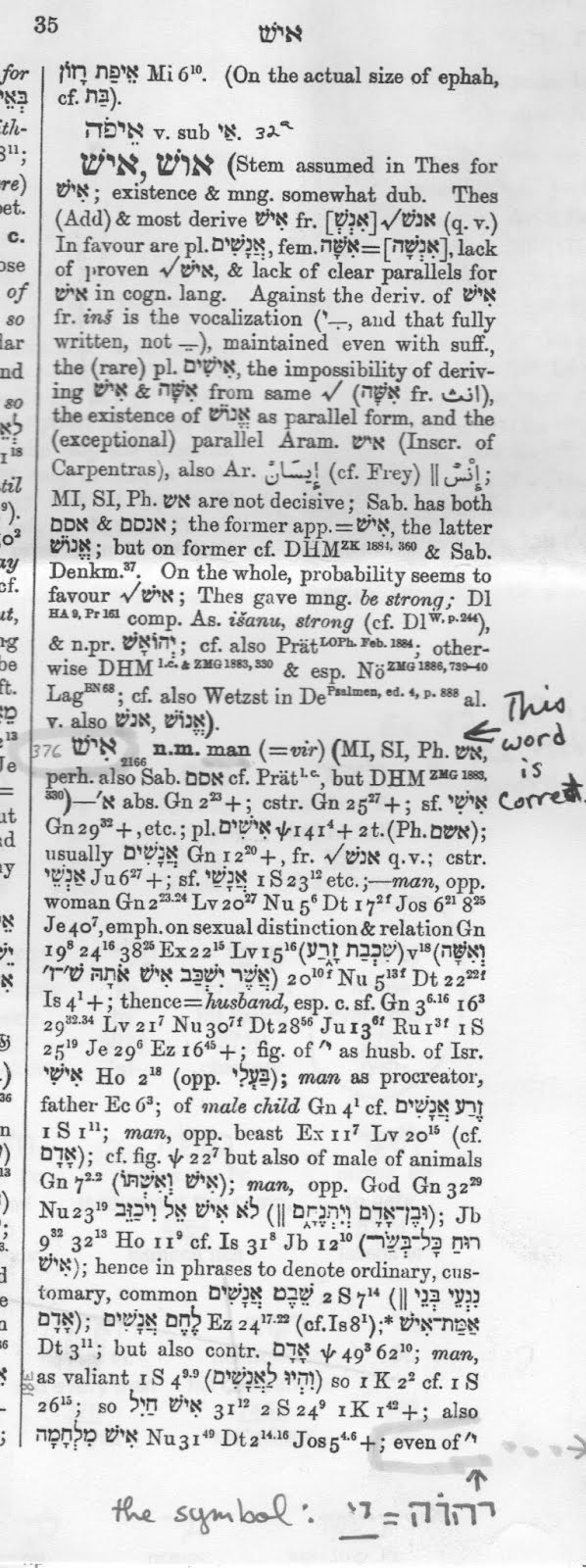
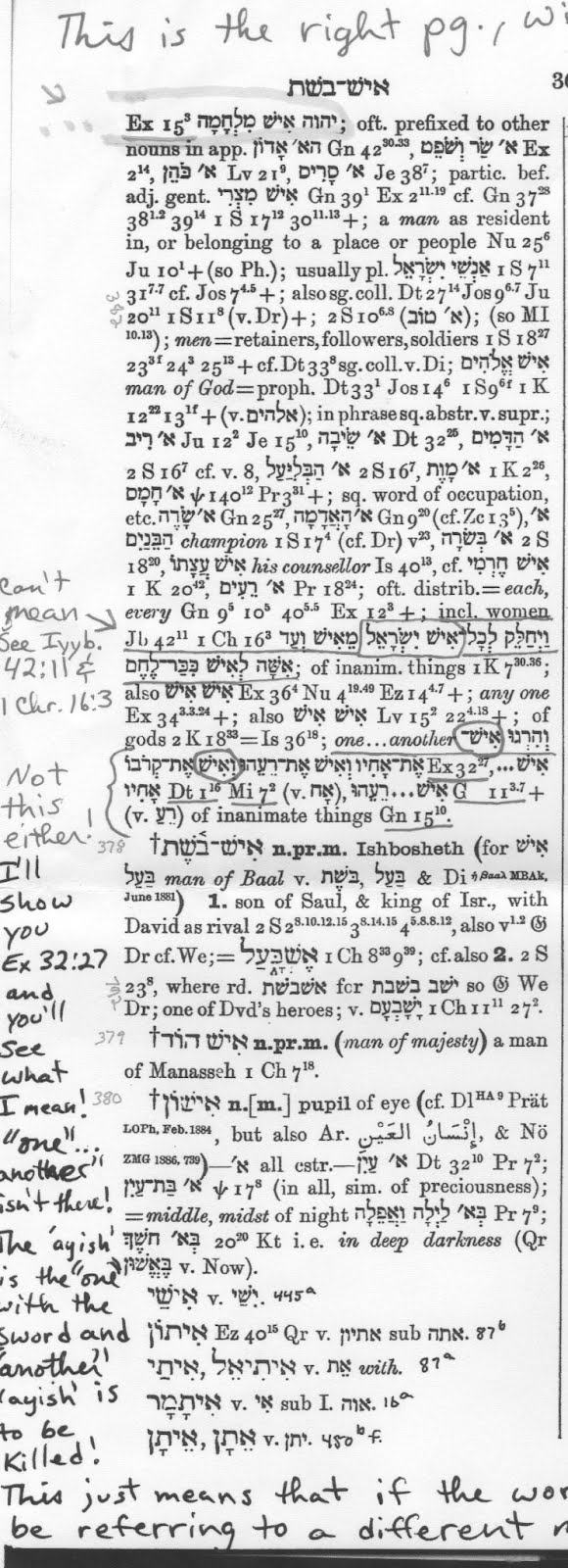
Notice on page 35, the hebrew word for man is ish: and notice the definition for this word is man and at the bottom of the page 35, top of page 36, we find its usage in Exodus 15:3.
(*editor’s note: when using a lexicon, you can’t pick and choose any
hebrew definition you choose, you have to use the word defined, for the particular scripture you are examining) PLEASE
NOTE!!! On top page 36 the word stops at the semi-colon, nothing past that semi-colon is used for the interpretation of Exodus 15:3!
Let’s go to the next translation by Yisrayl Hawkins:
malachmah is listed on page 789 of Volume 1 of the Hebrew-Aramaic-English Dictionary by Marcus Jastrow.
We just saw that in Brown, Driver, and Briggs as translated by Edward Robinson, that malachmah or milchamah, as it should be transliterated means: war.
So let’s examine Marcus Jastrow’s translation of malachmah on page 789.

We can see that Marcus Jastrow shows the definition of the word malachmah is defined as: war, contest.
PLEASE NOTE THE CIRCLED WORD ABOVE IN MARCUS JASTROW’S BOOK, (M.KAT 25)
What Mr. Hawkins did was, instead of taking the proper definition of the word: malachmah, which is translated as: war, contest; he chose to take an Aramaic eulogy from the Talmud showing what a sage or Rabbi thought about ‘M. Kat.’ (=Mo’ed Katon, Talmud) which was meant as an allegoric
interpretation of the dead man’s written eulogy, not as a TRANSLATION (Jastrow inserts the following from M.KAT: ‘an offspring of worthies came up from Babylonia and with him came the book of wars’) YOU THE READER CAN READ IT FOR YOURSELF IN TALMUD BOOK: MO’ED KATON 25b, if you have a copy.
In this allegory interpretation, the only thought you can transpose into a changed word is LAW, which is the thought to be meant by the word wars, because the word knowledge in this allegory, replaces the word book (ספר), which is clearly in the eulogy and not in the scripture found in Exodus 15:3!
Mr. Hawkins then goes on to say that:
This Scripture is actually saying:
.Exodus 15:3—
For from one man, Yahweh’s Servant Yisrayl, will come Knowledge of the Laws of Yahweh and His Name.
So what Mr. Hawkins did was to insert, exchange, and replace words in the Torah, contrary to the Law that commands us not to do so!
His translation has major consequences to the true believer of Yahweh, if they follow his horrible translations. Is he purposely mistranslating the word of Yahweh?
I called the House of Yahweh office in Abilene, Texas (325-676-9494) to inquire of this blunder and was able to talk to their resident scholar, Kahan/Elder David “Yehudah” Verner Hawkins, and questioned him of this errant, blatant mistranslation. Here is a transcript of part of our conversation:
KEPHA ARCEMONT: “I was reading this month’s PW Magazine where there are several mistranslations of scripture; references to the wrong page of hebrew words, you defined, from the Hebrew Lexicons; wrong definitions were used; and outright wrong interpretation of the defined words! Can you explain this blunder?”
DAVID VERNER: “Sometimes we hit the wrong key on the computer and it’s possible that it didn’t get checked by the proofreaders before printing!”
KEPHA ARCEMONT: “Can you spend a few minutes and get the copy of the PW Word Magazine and let’s look at the points I have in question, specifically, Exodus 15:3?”
DAVID VERNER: “Look Arcemont, I don’t have to explain anything to you, you are a fall away from the HOUSE OF YAHWEH, and therefore are not worthy of any response!”
KEPHA ARCEMONT: “So you are saying that, because I was kicked out of your HOY, I can’t get a question answered?
DAVID VERNER: “That’s right!“
KEPHA ARCEMONT: “So then if I was never a member in your HOY, would you answer my questions?“
DAVID VERNER: “Yes, of course!”
This is the type of cat and mouse games they play when serious questions are asked by those questioning their dogma. Since he dodged the questions, refused to answer them, and then hung up on me, I am asking you, the reader, to call this HOY and ask them the same question! See if they will answer and respond to this blatant, outright, mistranslation of Exodus 15:3!
Getting back to their errors. Notice above in red, his translation of Exodus 15:3, where he has done the following:
Italicized the word Yahweh’s which means to any reader of scripture that the word, “Yahweh’s” is an added word by translation! )This is outright deception!
Added the word Yisrayl, which can’t be found in any bible translation, nor in any Hebrew Lexicon’s definition or translation concerning Exodus 15:3 on the planet!
Added “will come Knowledge of the Laws of Yahweh,” based on Talmudic Sages thoughts about a dead man’s eulogy and which has nothing to do with the word milchamah in definition or translation as found in Marcus Jastrow’s Lexicon!
In baseball there is the 3 strike rule! BBYH has struck out (of his mind, possibly)!
1. mistranslation of ish/ayish
2. mistranslation of milchamah
3. Italicizing Yahweh’s name, which is in the scripture twice, and adding Yisrayl, which is not there at all!
The translation of this scripture in Exodus 15:3 by Biblical Hebrew scholars, show that Yahweh is a War’s man = warrior, or “war’s defender”, Yahweh doesn’t start any wars! But he does defend his people against those who came against the Nation of Isra’el, in this case the Egyptians! In Hebrew, ‘man of war,’ “warrior” is now the preferred translation since “man of war” is more commonly known today as a warship. The expression indicates that Yahweh is one who will fight for His people, He is not a soldier on the front lines, He is THE soldier or warrior overseeing the battle! The word “war” modifies “man” to reveal that Yahweh is a warrior. Other passages use similar descriptions: Isayah 42:13 has “man of wars;” Psalm 24:8 has “mighty man of battle”; Numbers 31:28 has “men of warriors, soldiers.”
CONSTRUCT CHAIN OF HEBREW LANGUAGE
If a HOY’s translators (mainly Kahan David Verner “Yahodah” Hawkins and “Pastor Yisrayl Hawkins”) understand the Hebrew language, they should have not made such a blatant mistake in translation, (improper spelling, wrong page #’s from the Lexicons, and wrong word definition). Unless, of course, they are deliberately mistranslating the scriptures to deceive the people! The scriptures are very clear, that, “many of you should not become teachers, because we receive a stricter judgment!” It is with that order, from scripture, that they are under scrutinizing eyes and examination by the TRUE, House of Yahweh, the House built without hands, which is those who have the Spirit of Yahweh!
What we find in the passage in Exodus 15:3 is what is known as, Hebrew Construct State, when you see the words: “The Yahweh is a man of war.” Usually you will find it in the plural such as “men of war.” This word usage in the Construct State can be found in: I Samuel 7:11; 31:7; Yahshua (Joshua) 7:4,5
The word: Yahweh: man=ish, is a construct with the word: war=milchamah as found in Exodus 15:
Introduction
to the Hebrew Construct Chain: In Semitic language there are joining of nouns. The joining of nouns into a genitive relationship by the use of juxtaposition (two or more specific nouns side by side) and a linking condition of these nouns.
For example: יהוה איש מלחמה
absolute construct proper noun *remember Hebrew is read right to left! “of” relationship
The first noun of the pair (man=ish) is said to be in “construct” relationship with the following noun (warrior=milchamah), which is said to be in the “absolute” state. When two nouns appear in a row like this, the relationship expressed between them is one of possession, and the first word of the pair should be translated with “of” following it. (ish: man of, milchamah: warrior)
This should not be confused with a maqqef, (which is joining the words as one in pronunciation) In a maqqef state, a pair of words in the construct state, is considered a single unit in pronunciation. Phonetically, the accent shifts away from the first noun to the absolute noun, and this loss of stress causes changes in the words vowels. For example, milchamah changes to m’lchamah.
The Lexical form (or dictionary definition) of a noun is always listed in the singular absolute form; for example: the word milchamah is listed as a feminine noun. However, you will need to be familiar with the construct spelling of Hebrew nouns (both in the singular and in the plural) since the construct relation is common in the scriptures. Unfortunately, the vowel changes are hard to master; fortunately, if you have memorized the absolute form, you shouldn’t have too much trouble recognizing the construct form when you see it. A word in the absolute state may stand alone; on the other hand, a word in the construct state never stands alone, (it’s always seen as the first word of the pair).
Since many of us are not experts in Hebrew grammar, try to get a bible program, like TC Bible Studies Edition 5 (a scholarly edition), or BibleWorks, making sure that the program includes the parson of the word with the numeration of the word (Ex: The Interlinear Bible by Jay Green) Remember in any language, spelling counts!!!!
The Maseorites in their copy of the scriptures, the words had to be pronounced exactly the same way! They created a vowel point method that would be freezed forever throughout time when pronouncing hebrew words in the scriptures. This would be so that foreign accents would not change the pronunciation of the hebrew language. They never made a dictionary, they only froze pronunciation!
Yisrayl Hawkins changes the words through pronunciation which is a no-no in the Hebrew language.His apparent lack of skill in Hebrew grammar makes his translations laughable to any Hebrew linguistic or grammar student. He puts the vowel sounds before the consonant sounds such as in man=ayish, which should be pronounced ish.
Mr.
Hawkins is Hebraically illiterate, which can be seen by this horrible mistranslation of Exodus 15:3! What this means to the bible student is Mr. Hawkins has NO schooling in Biblical Hebrew and it shows by his translations! Therefore, he needs to leave translation up to those who understand it and have been schooled in Biblical Hebrew!
A living language and the meaning of its words are constantly added to its dictionary. A dead language is frozen in time. Biblical Hebrew ended at the captivity of the Hebrew into Babylon, which is to our benefit! The language is frozen in time and didn’t undergo the changes that the language suffered in Babylon!(Yahweh must have wanted to freeze the language in time for our benefit!) We were not raised in Biblical Hebrew and therefore schooling is needed for us to understand the Biblical Hebrew language. What Mr. Hawkins is doing in translation should not be acceptable to any serious bible student searching for truth! If one is searching for correct information in the scriptures, through definition, then every bible student should either learn the basics of biblical Hebrew language or seek the knowledge from someone trained in theknowledge of it! If Yahweh were going to hide a meaning, he wouldn’t hide it under a word he didn’t pick, or in another word! Why would anyone want to seek translation of the Hebrew scriptures from a former rockabilly singer, ex-cop, with NO BIBLICAL HEBREW TRAINING? This would be like someone going to get their car repaired, from a t.v. repairman!
ONE MORE EXAMPLE OF IMPROPER TRANSLATION, IN THE SAME AUGUST, 2012, PW MAGAZINE, THIS TIME IN THE GREEK LANGUAGE
In this months PW Word, August, 2012 edition, on page 12, right after the Exodus 15:3 fiasco, Mr. Hawkins, gives a false witness about this scripture in Revelation 6:9. This makes him a false witness! Revelation 6:9 is another fine example of his butchering of language. In this scripture, he goes from singular to plural, to make the word “testimony,” into “two witnesses”. He ignored the plural spelling of the word slain which is #G4969 and the plural spelling, “of what the slain men held, #G2192 (they said the same thing)”. You have two plurals (before and after the one singular word: witness) and the testimony (singular) given by the men slain, is because they said one and the same thing (what they witnessed, not that they were witnesses). The witness, is not a being, but is their statement, (i.e. testimony, of what they witnessed; something seen, not the actual men), which is singular. The ones condemned is plural, and “which they held” is plural. He is confused in how to have a singular noun within two plural verbs. Which can only be translated that the plural verbs them who are slain, the singular testimony is that they all said the same thing. He continues to vacillate back and forth, of how to make the scriptures all about him, and he will fail, due to the construct of the sentence in itself, (i.e. not paying attention to the spelling)! He did the same thing with his name: Yisrayl!
CONCLUSION
A few points to consider from this review:
Spelling counts!
Translation counts!
Proper Lexicon usage counts!
Grammar counts!
Knowing hebrew construct counts!
Pronunciation of the Hebrew words count!
A House of Yahweh, under Yisrayl Hawkins in their translation of Exodus 15:3 is the work of a self taught amateur. His work does not give glory to the creator, Yahweh in any way, but in this writers opinion seems to be more geared toward the glorification of a man, Yisrayl Hawkins. What is also interesting is that his chosen name, “Yisra-yl”, is not even found in any hebrew manuscript or bible on earth, except his church’s translation, called “the Book of Yahweh”.
He obviously doesn’t even have the rudimentary elementary, understanding of Biblical Hebrew grammar, Hebrew construct; otherwise how could someone whose organization boldly states to be the “pillar and ground of the truth,” make such a blunder? Yahweh states, “My people are destroyed for lack of knowledge!” This translation of Exodus 15:3, qualifies as destruction of knowledge by this writer’s assessment of this horrific translation by a House of Yahweh.
Remember, you can’t insert or exchange words, as you please, in interpretation or translation of scripture, unless your intention is to deceive people!
Should Mr. Hawkins correct his mistakes, I would then believe this blunder was from pure ignorance of the Hebrew/Greek language. However, it would be best for him and his colleagues to stay out of the business of bible translation as I am afraid many untutored and ignorant bible students, are taking him seriously.
NORAH, A WOMAN CREATED BY YISRAYL HAWKINS, THROUGH INTENTIONAL BIBLE MISINTERPRETATION AND MISTRANSLATION!
By Kepha Arcemont
Let’s tackle another misinformation campaign by Yisrayl Hawkins. This review will examine the story of the woman at the well found in Yahchanan (John) the 4th chapter. This story is interesting in the fact that the story, as told by Yahshua, reveals the future worship of Yahweh. He also reveals a point that at some point in time, Yahweh would not be worshiped in the city of Jerusalem, nor on the mountain of Samaria, Mount Gerazim, where there was a House of Yahweh.
The story of his brief encounter with a woman, like so many in the New Testament, really doesn’t put the emphasis on the person he encounters, and speaks to, as much as the message that Yahshua is stating in the text. We will find more hebrew language inaccuracies, by the House of Yisrayl, as we research this
subject.
THE WOMAN AT THE WELL
Back in March 2012, Yisrayl Hawkins put out doctrine concerning this woman at the well. His theory was that she is a woman, whom Yahshua took as a concubine, and who anointed him with the precious spices and ointments that we find mentioned in the four gospels. The womans name according to Yisrayl Hawkins teaching, is Norah, prounounced, Nor-ah. According to Yisrayl Hawkins, she took the work of Yahweh to new heights after the death of Yahshua. Now where he gets this information is beyond me, this theory is about as bizarre as his one on, Satan creating dinosaurs (if anyone can show me a scripture for either to back up this theory, I will examine my discourse and recant any error.)
Are we supposed to read between the lines when reading scripture? NO! Can we make assumptions and then call them inspired words to preach as doctrine? NO! Does anyone have a right to question what is taught by a person who calls themselves a holy man of Yahweh? YES! The Apostle Shaul whose letters are listed in the New Testament and whose writings are recorded more than any other Apostle in New Testament times, was questioned by the Bereans.
Acts 17:10,11
“And the brethren immediately sent away Shaul and Silas by night unto Berea: who coming thither went into the synagogue of the Jews. These were more noble than those in Thessalonica, in that they received the word with all readiness of mind, and searched the scriptures daily, whether those things were so.”
The Bereans are mentioned in the scripture for their noble quality of receiving the word and searching the scriptures to see if what they were being taught was right. This noble quality has made them infamous when anyone speaks of these people. Should not, we, as believers of Yahweh also be of a noble quality, by examining what is taught by anyone who preaches the word of Yahweh? Not so, by Yisrayl Hawkins! I have asked in numerous emails to his HOUSE OF YAHWEH, “let’s sit and reason together with these doctrines that you are teaching and examine them.” Their response from some oftheir Elders/Kahans/Deacons, is it doesn’t matter what the scriptures say, we only believe what Yisrayl Hawkins tells us. They don’t question anything that is taught, even when it is proven wrong! Why? Well because they are taught through constant indoctrination, to not question their teacher, Yisrayl Hawkins. They are
told to believe what he says without question! If anyone questions his teachings, they are considered a heretic and are kicked out of his church! While I admire their loyalty to a man, I think it is a shame they can’t show the same loyalty to Yahweh! Or at least follow the example of the Bereans, who proved all things. However, because they don’t prove all things, they don’t question anything that is presented to them, which is in opposition to their buffalo god, because they don’t have the noble quality of the Bereans. These people remind me of the Jews of Thessalonica, which is mentioned a few verses down from this scripture.
Acts 17:13
“But when the Jews of Thessalonica had knowledge that the word of Yahweh was preached of Shaul at Berea, they came thither also, and stirred up the people.” I saw this firsthand last year, when we held the Feast of Unleavened Bread and the Feast of Weeks 2011, as well as many sabbath days at the Lions Club in Eula, Texas. The HOUSE OF YAHWEH officials were so stirredup, they sent spies to investigate us, spoke about us in their sermons, and then made several derogatory videos about us, which were put on their youtube account. I notice that they have taken some of them down; maybe because they were so corny and ridiculous, that even they saw how much of a fool their Elders/Kahans, appeared! The Apostle Shaul didn’t let these peoples stirring deter his mission to preach and publish the message of Yahweh.
Acts 17:17
“Therefore disputed he in the synagogue with the Jews, and with the devout persons, and in the market daily with them that met with him.” Please notice he disputed with the Houses of Yahweh where those who were called Yahdaim preached! Should we be disputing with the Jews at a HOUSE OF YAHWEH in Clyde, Texas? At this point, I would have to say anyonewho has empathy, should and would do the right thing, by exposing these awful mistranslations of scripture!
I know that several people have made many attempts to talk with their Elders and compare the scriptures mis-translated and wanted an open forum on these matters. Once again, I will extend this invitation to Yisrayl Hawkins and any of his Kahans, to get together and let’s bring our bibles, Book of Yahweh, lexicons, studies, etc., so we can get a full explanation of their mistranslations. We only seek to prove all things, rightly dividing the word of truth! Or at least respond to our emails and answer our questions!
Getting back to the point of this letter, the woman by the well. Is she someone that we are supposed to remember? Is Yahshua’s meeting of this woman
who had many husbands important to the work of Yahweh in these latter days? Yisrayl Hawkins has gone through great lengths to teach his followers that this woman, whom he calls Norah, is a great woman. He has taught that she is the woman who anointed Yahshua with the precious oils and spices.
First, let’s read what the scriptures states about the woman who anointed Yahshua, days before his death.
Mark 14:3
“And being in Bethany in the house of Simon the leper, as he sat at meat, there came a woman having an alabaster box of ointment of spikenard very precious, and she brake the box, and poured it on his head.”
Now what is interesting about Mark’s writings is that he doesn’t mention the name of the woman! Yahshua said that what she has done would be a memorial for what she did, but yet the writer, Mark, seems to not mention her name. However, we do have other writers of this event who do mention her name.
Yahchanan (John) 12:3
“Then took Mary a pound of ointment of spikenard, very costly, and anointed the feet of Yahshua, and wiped his feet with her hair: and the house was filled with the odour of the ointment.”
There has been debate about these two accounts as the one in Mark mentions him being in the house of Simon, and the other being in the house of Lazarus. The writer of Mark says this occurred two days before the Passover, and the writer of Yahchanan says it occurs six days before the Passover. Let’s examine the other writers account.
Mattithyah 26:7 “There came unto him a woman having an alabaster box of very precious ointment, and poured it on his head, as he sat at meat.”
This account records him as being in the house of Simon the leper as Mark does, also two days before the Passover. Luke mentions a woman who anoints him with oil.
Luke 7:37,38
“And behold, a woman in the city, which was a sinner, when she kneww that Yahshua sat at meat in the Pharisee’s house, brought an alabaster box of ointment, and stood at his feet behind him weeping, and began to wash his feet with tears, and did wipe them with the hairs of her head, and kissed his feet, and anointed them with the ointment.”
The Gospels offer several stories of women who come to anoint Yahshua. Some of these are clearly parallels, but one seems not to be. The parallel stories are found in Matt. 26, Mark 14, Luke 7, and John 12. It is my argument that we have only two incidents reported, but by only two different women — Mary the sister of Martha (Matthew, Mark and John), and an unnamed woman who was a sinner (Luke).
Some preliminary critical questions:
In conclusion: We have only two anointings and two women here, and while we have some differing focal points, we have no contradictions as such. The variations we see are no less or more than we would expect from stories that went through the process of oral tradition. (Though there are also signs, especially here, that John at least knew Mark’s account; see here.)
THE TEACHINGS OF YISRAYL HAWKINS AND HIS HOUSE CONCERNING THE WOMAN AT THE WELL WHOM HE CALLS “NORAH” AND HIS SONG TO NORAH!
With the information shown thus far, we have no account of any woman named, “Norah,” in the Holy Scriptures. However, Mr. Hawkins has gone through great lengths to keep his indoctrinated members, worshiping not only him, but now giving honor to a woman named, “Norah,” at a memorial that is to remember our High Priest and King, Yahshua called Messiah. At Yahshua’s Memorial 2012, Mr. Hawkins house went to great lengths to bring forth a woman, named Norah to his congregation, whom he claims is the woman at the well mentioned in Yahchanan 4th chapter, and that this woman anointed Yahshua before his death! He then explained that this woman, carried on the work of Yahweh after his death. She was compared to Yisrayl Hawkins as a woman who was taken out of deep, dark sins and that they both are memorialized in the word; ME-NORAH. ME was Yisrayl Hawkins, and NORAH was the woman at the well. They even memorialized both of them in a song. Enclosed is a copy of this song that the congregation of Yisrayl Hawkins sung to Him and this dead woman called Norah!
The name of the song is called: THAT WOMAN
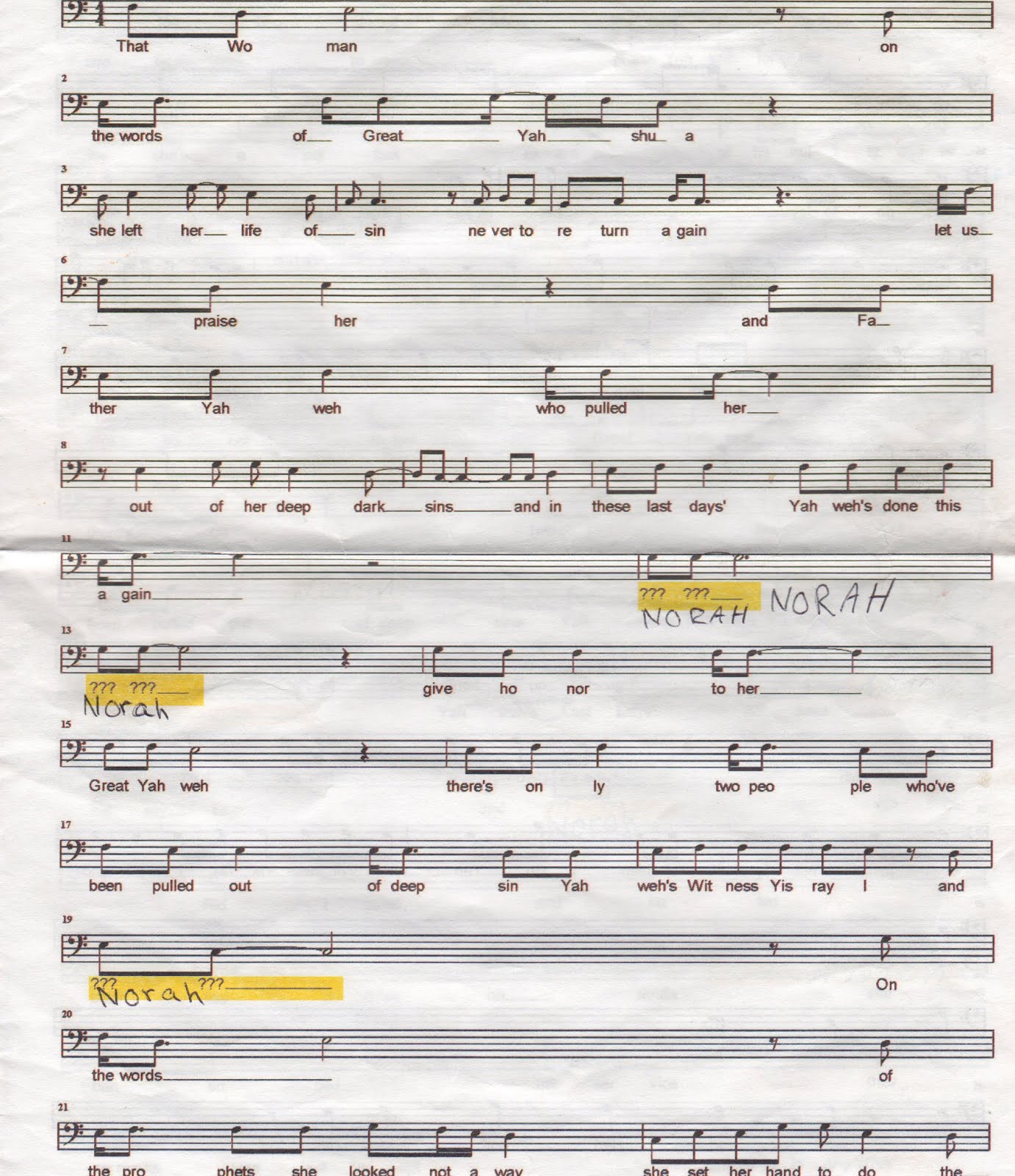
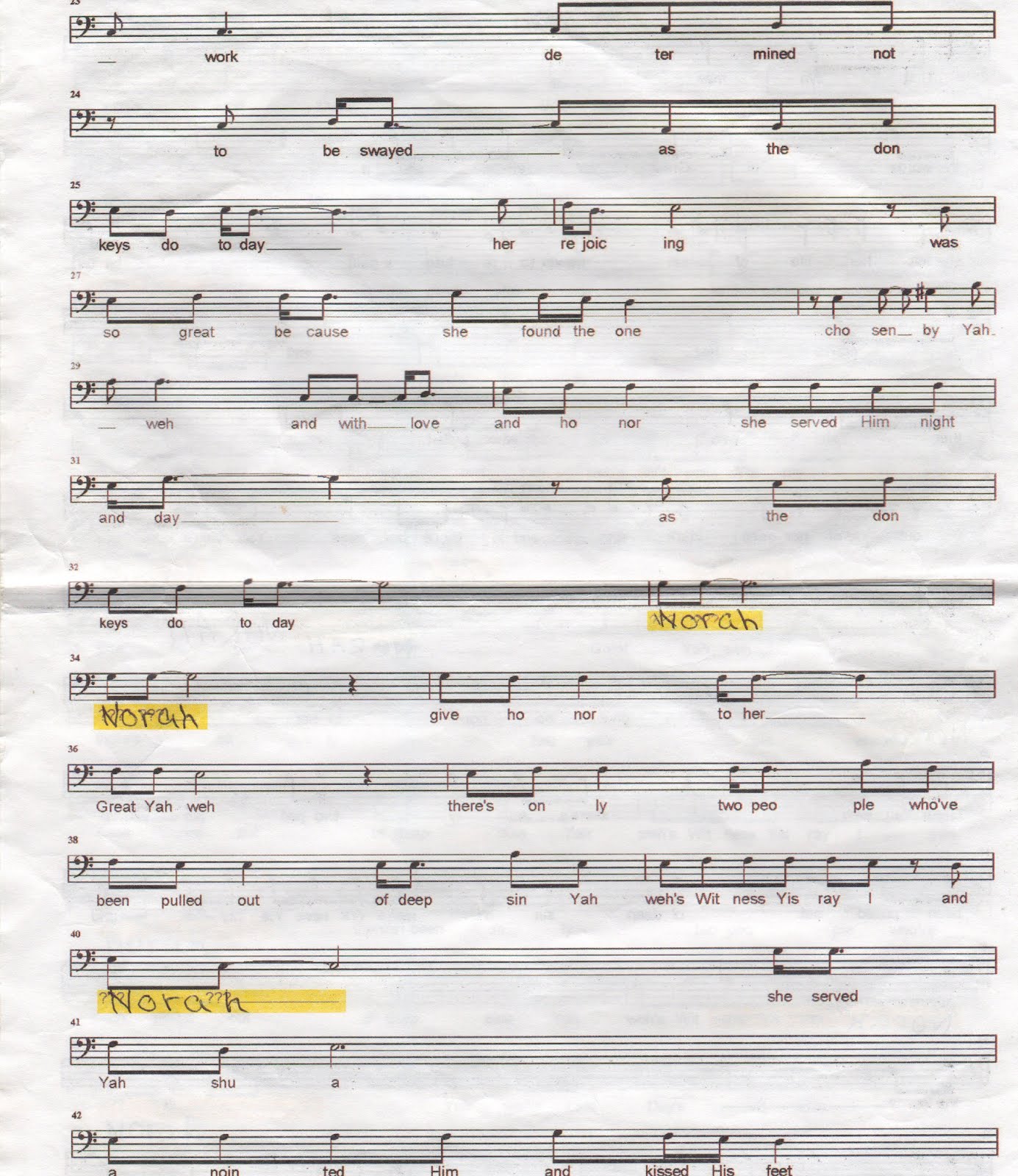
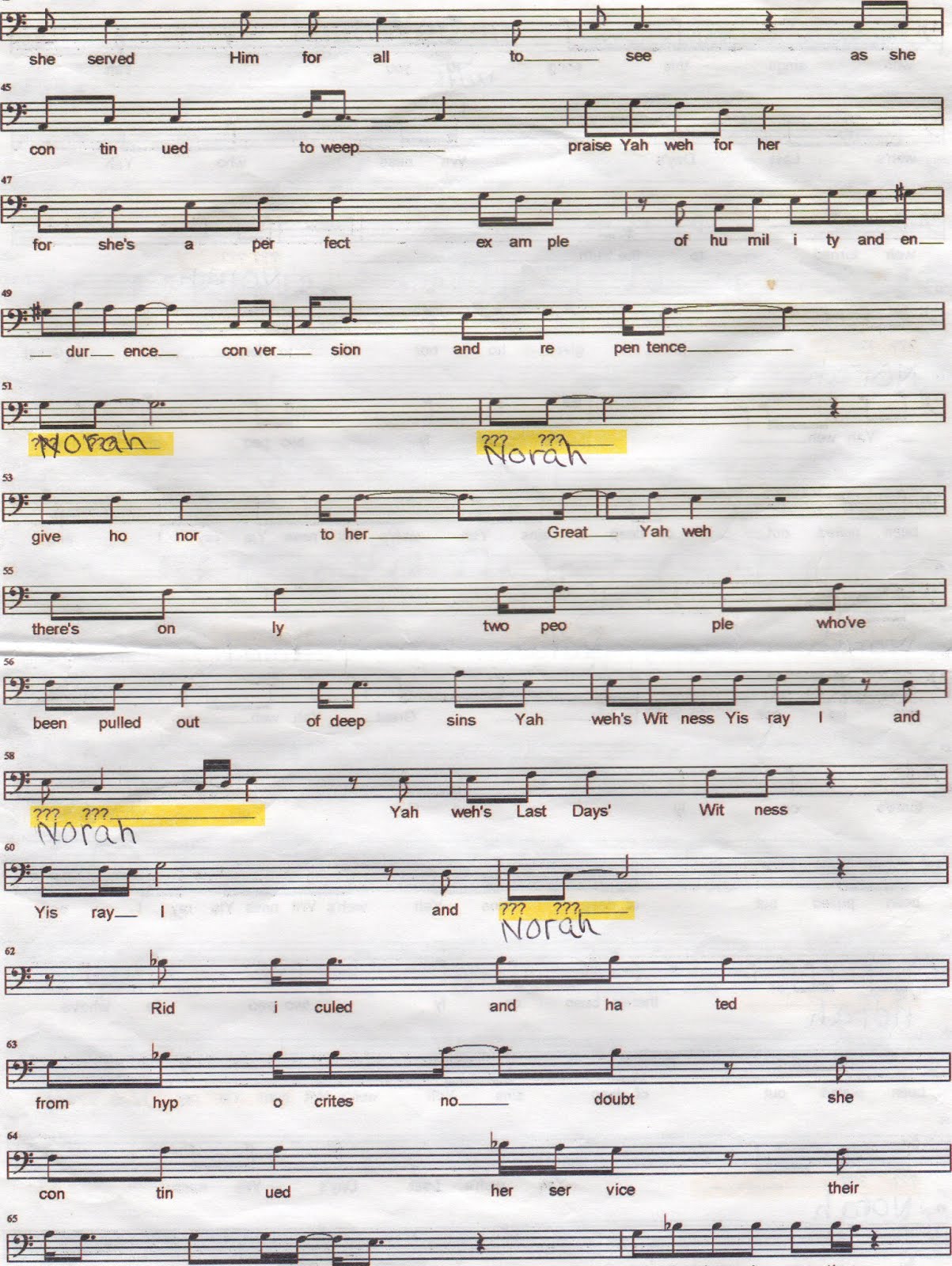
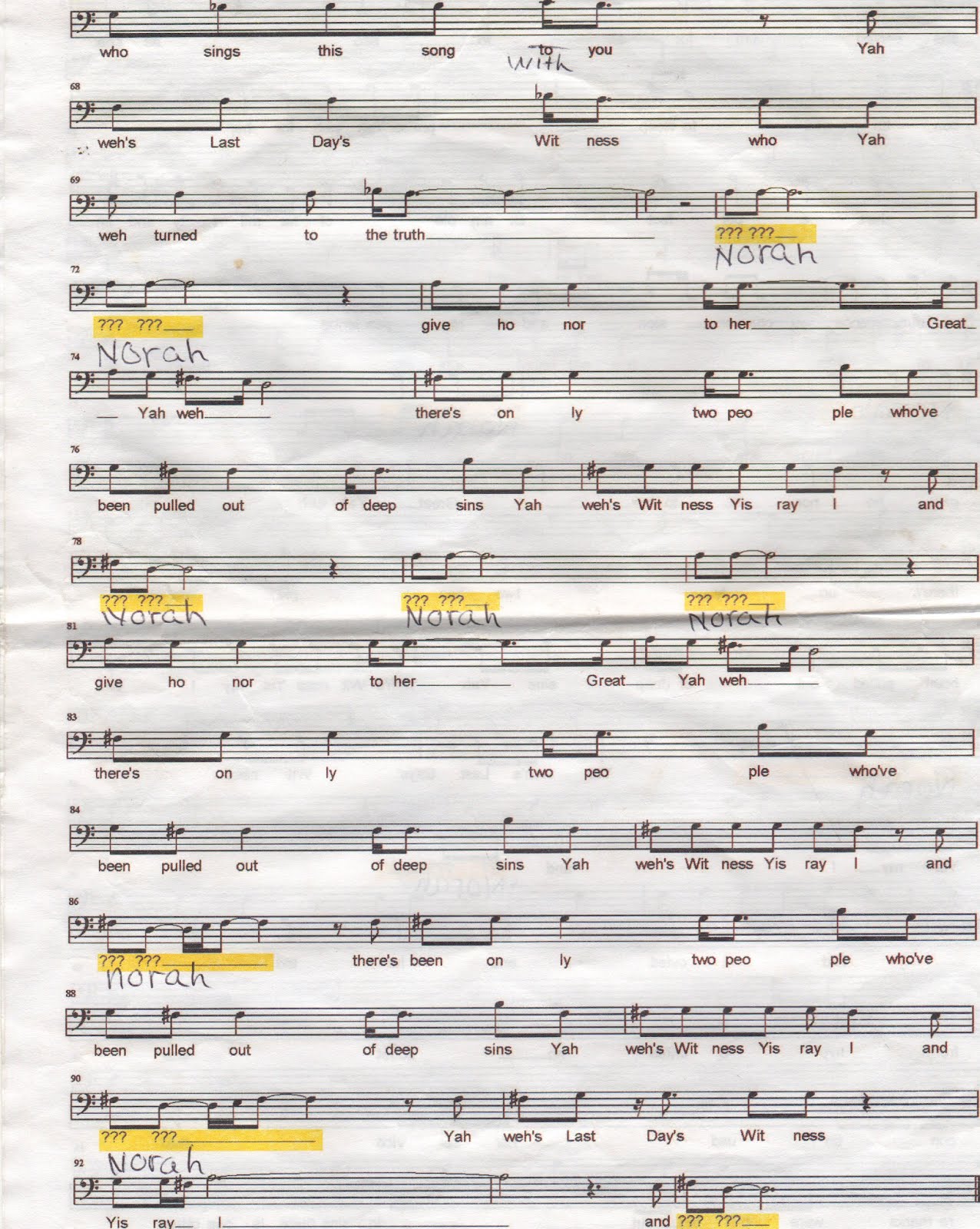
What you see here in this song is called subliminal, superliminal or liminal messages. This song is designed to send a message to those who are listening to
it and it’s message is quite clear to those who are familiar with liminal and subliminal messaging.
Liminal messages: A message delivered directly, but without a strong, commanding presense.
Superliminal messages:
Delivering a message directly as a command or order, unlike sublimina messaging, which delivers them indirectly or without the receiver’s knowledge.
Subliminal messages: contrary to supraliminal stimuli or “above threshold”, are any sensory stimuli below an individual’s threshold for conscious perception. Some research has found that subliminal messages do not produce strong or lasting changes in behavior. However, a recent review of functional magnetic resonance imaging (fMRI) studies shows that subliminal stimuli activate specific regions of the brain despite participants being unaware. Visual stimuli may be quickly flashed before an individual can process them, or flashed and then masked, thereby interrupting the processing. Audio stimuli may be played below audible volumes, masked by other stimuli, or recorded backwards in a process called backmasking.
When words are put to music the remembrance is enhanced and the message comes across stronger and more apt for people to remember. In this song that Yisrayl Hawkins had his congregation sing, he has an implied message to all those who listen, especially the women of his house! He has used all three messaging to get his point across! This song is a memorial remembrance to the woman at the well, whom Yisrayl Hawkins says is a woman named, “Norah.” Here is a fine point to remember about the woman at the well in Yahchanan the 4th chapter.
What
is interesting to note is that every man and woman in the House of Yisrayl was singing a song to Yisrayl Hawkins and a woman named, Norah! However, this song about this woman was an example to every woman in His house! The women in the house of Yisrayl, some may have had several husbands before they entered the HOY, or the one they are married to at this time, if he is not in unity with Yisrayl Hawkins, or doesn’t display the character of Norah, would not be considered a woman’s husband according Yisrayl Hawkins teaching! Let’s take a closer look at some of the verses:
Now I would like to point out that in the last few years, divorce in the House of Yisrayl has been condoned and even encouraged. This was not so, in the early years of a House of Yahweh. Most recently in a sermon by Deacon David Knighten, the women were told that if their husband was not in unity with Yisrayl Hawkins, then they were not in unity with Yahweh and therefore there was no marriage! There has been at least 5-10 separations and divorces from women who have separated themselves from their husbands. Because the men realized that Yisrayl Hawkins was lying to them and deceiving them and opposed his teachings, the wives made a choice of separation or divorce! Now comes this song about a woman at the well, who by the way, the scripture are not detailed enough to warrant the details of this songs lyrics. Instead this song is a subliminal, liminal, wording to every woman in the House of Yisrayl, that if you have a husband, and he is not in unity with Yisrayl Hawkins, then the man you are with right now is not your husband! This is a play on Yahshua Messiah’s words that Yisrayl Hawkins has put a spin on! Notice another point of the lyrics.
Now I ask you, if there has only been two people who have been pulled out of sin, where does it leave the rest of us sinners? But what everyone should question is, where is this found in scripture that Yisrayl and some woman named Norah were pulled out of deep, dark, sin? The scripture says that, “all have fallen short of the glory of Yahweh!” This play on words to show, ME-NORAH, shows just how much these people have lost their understanding of the words of Yahweh. This deception is so obscene, it should make anyone who is reading this sick to their stomach! His detail into this woman at the well is mind boggling! Just how does he prove all these descriptive verbs about this woman, based on a few verses that mentions this woman in a passing moment! To anyone who reads the scriptures, if this woman was such a big player in Yahshua’s work, wouldn’t her name have been mentioned and more written about her? But let’s proceed on in this investigation into the doctrines of Yisrayl Hawkins (ME) and Norah (NORAH), who is a deep dark sinner, (at least he admits some facts here!) and this so called woman, calledNORAH!
THE NAME NORAH
So the first question any intelligent, inquisitive, and person searching for truth in scripture should ask is; is there a woman named Norah, in the Holy Scriptures? To understand the scriptures we have to know one thing first! The scriptures were written by Hebrew men, who wrote in the Hebrew language!
So let’s start with the word, “Norah” and ask a question. Is the word Norah in the scriptures and is it a word that is referenced to the word, “Menorah” found in the Old Testament. ANSWER: There is absolutely and unequivocally nothing Hebraically existing in the hebrew scriptures!
Now the House of Yisrayl’s theory is that “ME”, meaning Yisrayl Hawkins and a sinful woman named “NORAH” were both pulled out of deep dark sin into light; so ME (Yisrayl Hawkins) and NORAH were both brought to light, the light of Yahweh’s House, i.e., the House of Yahweh’s Menorah, and her name is spelled: N-O-R-A-H. There is an inherent problem with this theory:
 “menorah” is one single word, not a compound word!
“menorah” is one single word, not a compound word!.png) has no “ME” sound, just a slight half ‘eh’ sound, which sounds more like “mi” as in ‘minnow.’ However for the sake of argument: to change
has no “ME” sound, just a slight half ‘eh’ sound, which sounds more like “mi” as in ‘minnow.’ However for the sake of argument: to change .png)
‘Na’a’rah’ to sound like ‘Norah’ you would have to spell it with a holam vowel point: and that word simply does not exist! Let us look at this in what I will call exhibit 3, taken from “The Analytical Hebrew and Chaldee Lexicon by Benjamin Davidson.
and that word simply does not exist! Let us look at this in what I will call exhibit 3, taken from “The Analytical Hebrew and Chaldee Lexicon by Benjamin Davidson.
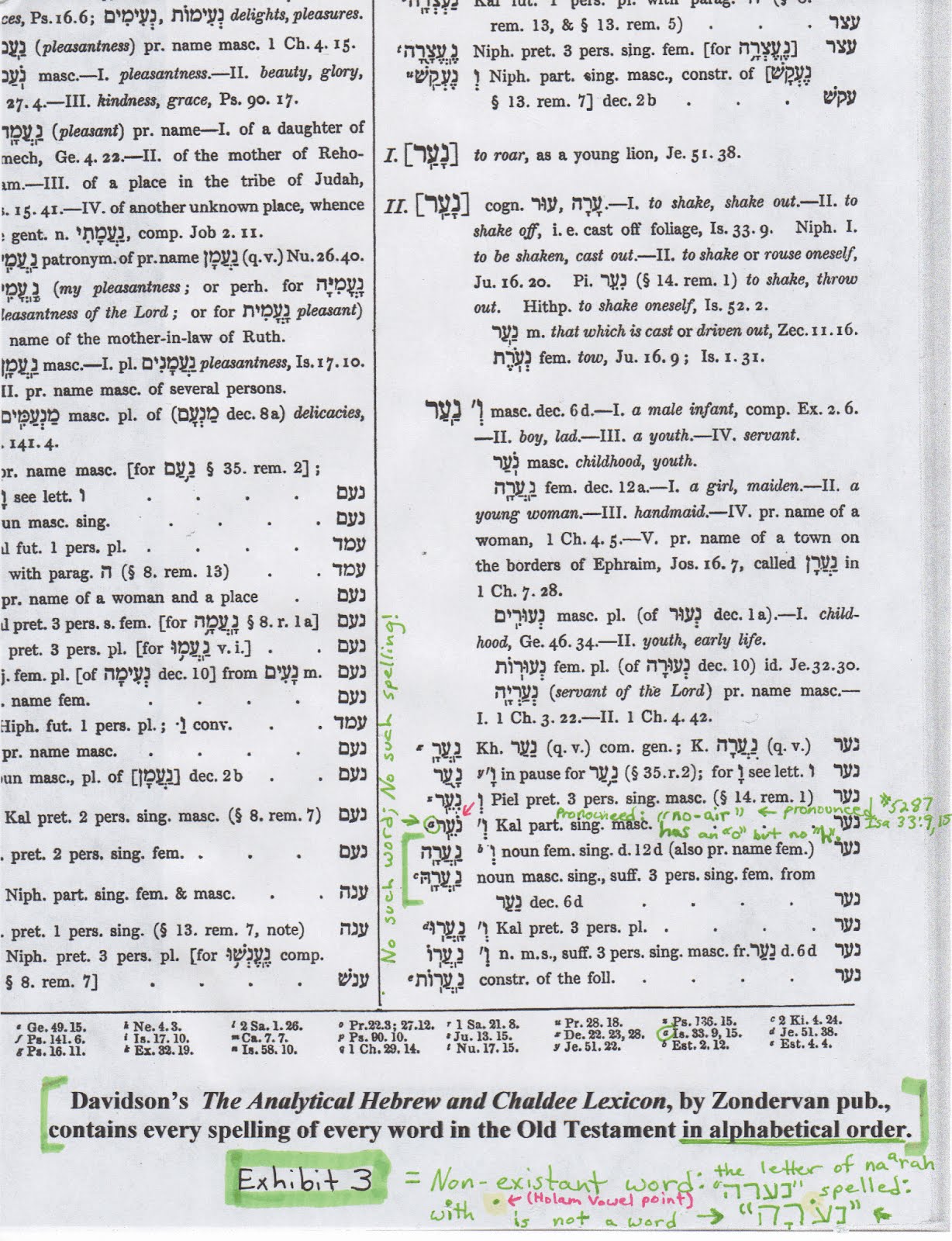
Asyou can see above by a respected Hebrew language scholar and writer, that Yisray l Hawkins has made a slight boo-boo in his attempt to sound Norah, like the sound of Me-norah. In order to sound it that way, you would have to spell it with a holam vowel point and that word does not exist, as the above mentioned lexicon points out!
Yisrayl Hawkins theory is that Menorah, is pronounced this way to include him (me) and this sinner (norah), thus ‘Me-Norah.’ And the hebrew equivalent is supposed to as the same as the Greek word “woman” as in the “woman at the well” that Yahshua Messiah spoke to and the word the Messiah used when he addressed his own mother while nailed to the stake in Yahchanan 19:26!
There is no equivalent of the Greek word “yuvai” that sounds anything like ‘norah’ of the me-norah; the closest is Na’a’rah which is NOT the hebrew dynamic equivalent of “Gunai” or woman!
That Greek word would be Strong’s Greek Dictionary #1135 ‘yuvn’- transliterated “gune.” However the Hebrew dynamic equivalent of ‘yuvn’ is  and is pronounced “esh’sha” which sounds nothing like the English name “Norah”, either. (The dynamic equivalent of gune being “ish’sha” is well documented by reputable scholars, such as Vines Expository Dictionary.
and is pronounced “esh’sha” which sounds nothing like the English name “Norah”, either. (The dynamic equivalent of gune being “ish’sha” is well documented by reputable scholars, such as Vines Expository Dictionary.

Also, the term ‘yuvn’ (woman) is Yahshua’s customary, courteous way of addressing women and by no means is it inclusive of a concubine, prostitute, sinner, or slave! (see Matt. 15:28, Luke 13:12, Yahchanan 4:21, 8:10, 19:26, 20:15 just to name a few!)
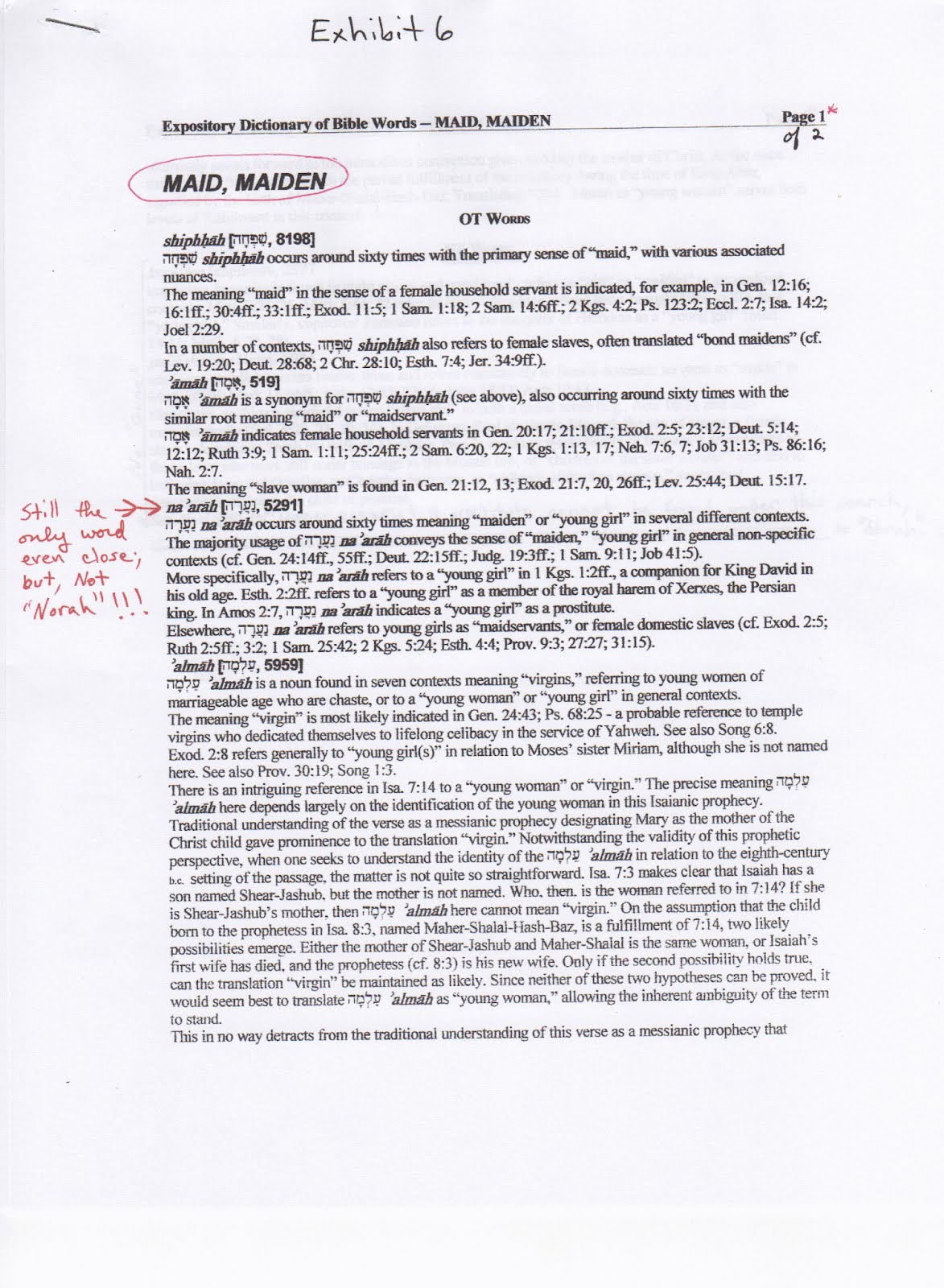
The term woman is not a disrespectful as noted by all reputable scholars such as Gingrich: yuvn, aikos, n woman–1. of any adult female and by no means disrespectful, but there is no generally accepted English equivalent for it, and it is best to omit the word in translation!
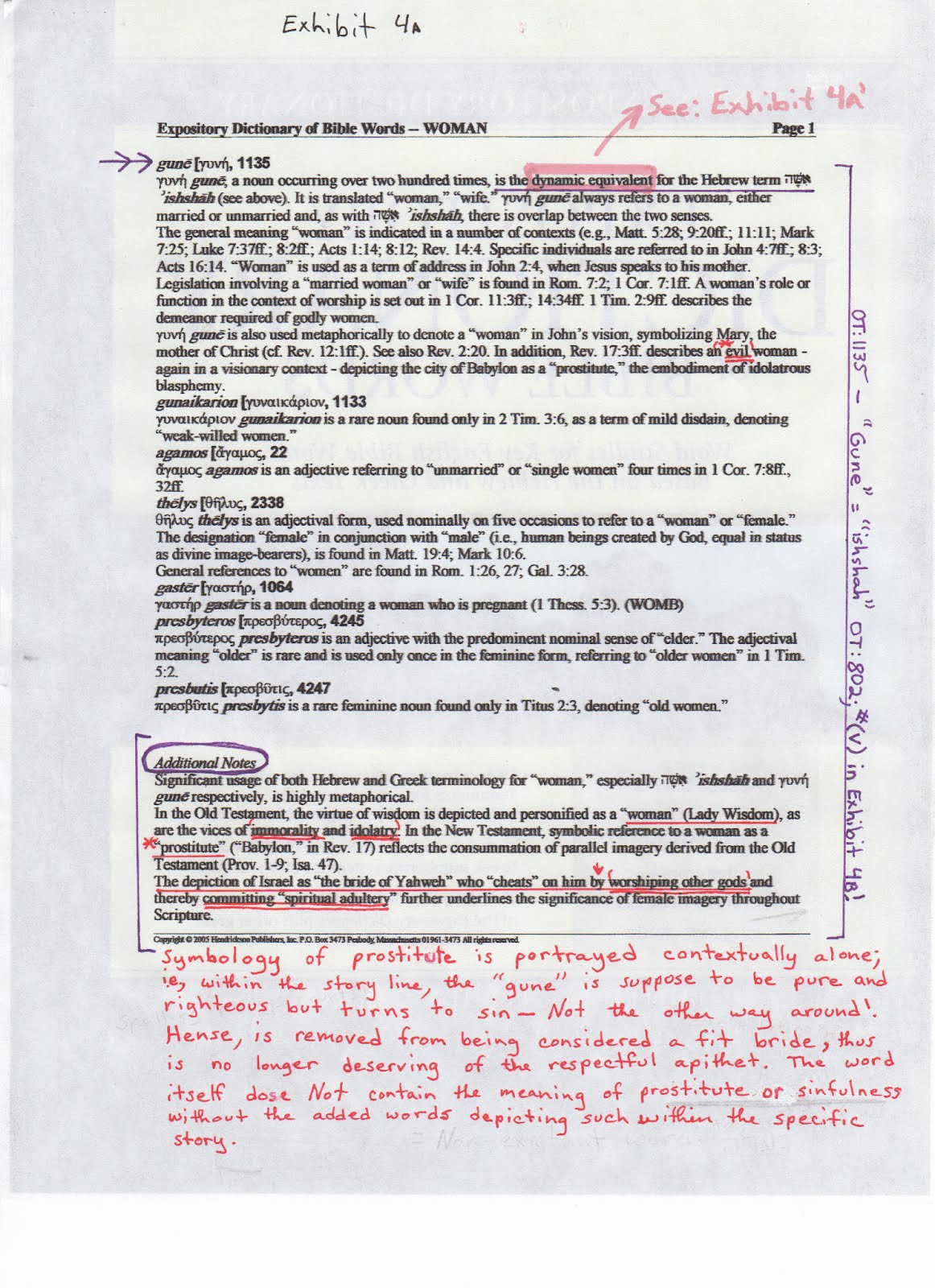
Spelling counts!!! Compare Esther 2:4 in the Greek Septuagint with Yahchanan 4:21; 19:26. The Greek word in Esther 2:4 is “yuvn” is spelled as Type K, 3rd declension, in the nominative (not a vocative, besides the fact that Yisrayl said it was used in Ruth;) however, in Yahchanan 4:21 and 19:6 is ‘yuvai’ which is specifically spelled in the Vocative!
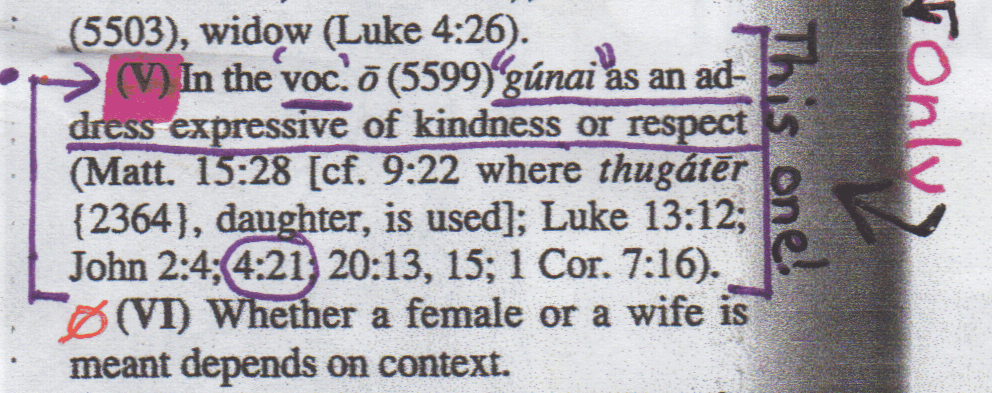

Pocket Dictionary for the Study of Biblical Hebrew, Page 178 defining Vocative:

“Guna” translated from “Na’arah” in the Greek Septuagint: Case in point—In Esther 2:4 the word is spelled “y-u-v-n” which is NOT in the vocative and IS IN the nominative. The vocative Greek is spelled: “y-u-v-a-i” and is especially limited in translating it back to the original Hebrew whose ‘dynamic equivalent’ is  Greek
Greek
translation of Esther 2:4:

English translation of Esther 2:4:

This is perfectly acceptable translation for the Hebrew “Na’a’rah” only when used in this specific context: (yuvn “Woman”) is being used as a generic “Wife” which is to be found. The Septuagint never chooses ‘yuvn’ as a Greek translation for the Hebrew “Na’a’rah” in reference to Ruth which is what is later claimed by Yisrayl Hawkins.
Mr. Hawkins seems to think that pronunciation does not matter in the Hebrew, Greek, or English language. I guess he can be let off the hook, by claiming to be a dumb Okie, as he has stated himself many times. However, the average bible student must be made aware of this blatant deception for what it is, exegetical fallacy! The truth seeking bible student must educate themselves so that they are not fooled as many are being fooled at a place called, “HOUSE OF YAHWEH.”
The word Yisrayl Hawkins was trying to say the hebrew word Na’a’rah, but because pronunciation doesn’t matter to him, he still tried to maintain the incorrect pronunciation of Norah. He is attempting to convince the reader that the word is a proper pronoun, of a sinful woman who repented, as he claims like him, and that Norah and Me (Yisrayl Hawkins), is to be honored at Yahshua’s Memorial Remembrance. He thinks
the Menorah, or the 7 lamp candlestand represents Him and this woman, Norah; hence, Me-Norah! NONE OF THIS IS CORRECT and is the strangest twist on scripture that I have seen anyone dishonor in translation! In the book of Ruth, “na’a’rah” in the Hebrew Old Testament is replaced by different Greek words in the Septuagint (Greek Old Testament). But not once is “Gune” used, let alone the Messiah’s respectful address of “Gunai”! Here are the usual choices:

Notice this is not “Gunai” or “Gune”!
CONCLUSION
Yisrayl Hawkins has already shown his interpretations are just that, “his interpretations!” His lack of formal schooling in the Hebrew and Greek language is so
obvious here that there is not one scholar who would take this work serious. They would look at it as a mythological story based on scripture. His lack of biblical hermeneutics is obvious! There is nothing in this study that is based on true definition of the biblical words used. This is nothing more than a fantasy that Mr. Hawkins has put in writing, and passed off as a new doctrine to keep his followers confused and in delusion.
REVIEW OF EZEKIEL 28:14, ANOTHER MISTRANSLATION BY YISRAYL HAWKINS!
by Kepha Arcemont
This month on the cover of the PW Magazine 9/2012 edition we read the following statement: “Scholars say the Book of Yahweh is the closest to the Hebrew language of any translation on the market”
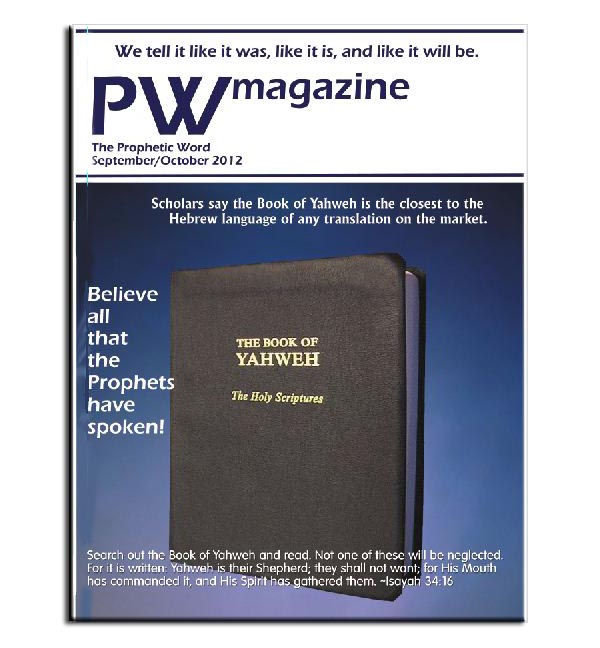
The first question that needs to be answered is: Who are these scholars and can Yisrayl Hawkins reveal their names and credentials to the public?
This week we will continue our examination of scriptural translations by Buffalo Bill Yisrayl Hawkins. Mr. Hawkins translation of Ezekiel 28:14,
as found in his “Book of Yahweh,” 10th edition, will be examined. In this book Mr. Hawkins attempts to show a marriage between Yahweh and the “cherub”, whom he claims is Yahweh’s wife! One must remember the time period and context of Mr. Hawkins own personal life, and how and why, this scripture was
translated this way, in order to understand the intent of Mr. Hawkins theory of Ezekiel 28:14.
In 1994, when Yisrayl Hawkins went through a divorce with his ex-wife Kay Hawkins, a book was published by him, “Unveiling Satan, Her True Identity Revealed,” which portrayed Satan/Lucifer as a woman, who was the ex-wife of Yahweh. It is this readers viewpoint, that this theory is transferred to his translation and interpretation of Ezekiel 28:14. I’ll let you, the reader decide, whether this translation is worthy of scholarly merit!
Reading from the Book of Yahweh 10th edition, published by a HOUSE OF YAHWEH:
Yechetzqyah (Ezekiel) 28:14 “You were the guardian cherub, and I married you on the holy mountain of Yahweh; you have walked up and down in the midst of the stones of fire.”
The Interlinear Bible by Jay Green’s translation translates this passage as:
Ezekiel 28:14 “You were the cherub anointed that covers and I had put you in the height in the holy height of god, where you were. You walked up and down in the midst of the stones of fire.”
THE ROOT WORD FOR CHERUB IS A SCHOLARLY DEBATE AND STILL UNDECIDED OF ITS ETYMOLOGY
The first thing we should address is that this scripture says that “you were the cherub”. Cherub is #H3742 which is defined as: cherub.
In the Book of Yahweh, 10th edition, page 649, there is a footnote (2a) at the bottom of the page, explaining the word “cherub” as found in Yechetzqyah 28:14. In this footnote, Mr. Hawkins states:
Hebrew root word “rab”, meaning cherub, an ancient Hebrew term for one who holds a ministerial office such as Priest, Elder, Malak, Levite, Deacon, or Deaconess in the House of Yahweh. Gesenius Hebrew and Chaldee Lexicon by Samuel Tregelles, page 753, also shows this word means, she who has many children, referring, in Yechetzqyah 28:13-19, to Yahweh’s estranged wife, who was also an officer in Yahweh’s House in that she was the wife of the greatest Priest of all, Yahweh, Himself! Instead of being satisfied with
the position of being the wife of the Creator of the universe, Yahweh’s wife let her pride overcome her. As a result, she left Yahweh, her husband, and became, Satan the adversary. See also Isayah 14:12-16.
Digressing for a moment, please note this reference, in Mr. Hawkins translation, as it eerily parallels his own personal life experiences and his own
marital view. His ex-wife (Kay) who held a ministerial office (Deaconess) within his church, now his estranged wife, was married to him, “the greatest priest of all (Yisrayl Hawkins) in his HOUSE OF YAHWEH. He then states “she left her husband, and became Satan, the
adversary!” Kay’s book “The House of Yahweh, My Side of the Story, confirms this relationship and this man’s contempt for her! For more information about her book, go to her website: www.kayhawkins.com
Getting back to the word cherub. The word “cherub”, as defined by Mr. Hawkins has some major flaws! Let’s examine some of his points!
First, he states that the root word for “cherub” is “rab”. He then reveals to the reader, that this definition can be found on page 753, where he borrows, “she who has many children,” as a definition! Below is a copy from The Hebrew Chaldee Lexicon by Samuel Tregelles, page 753.
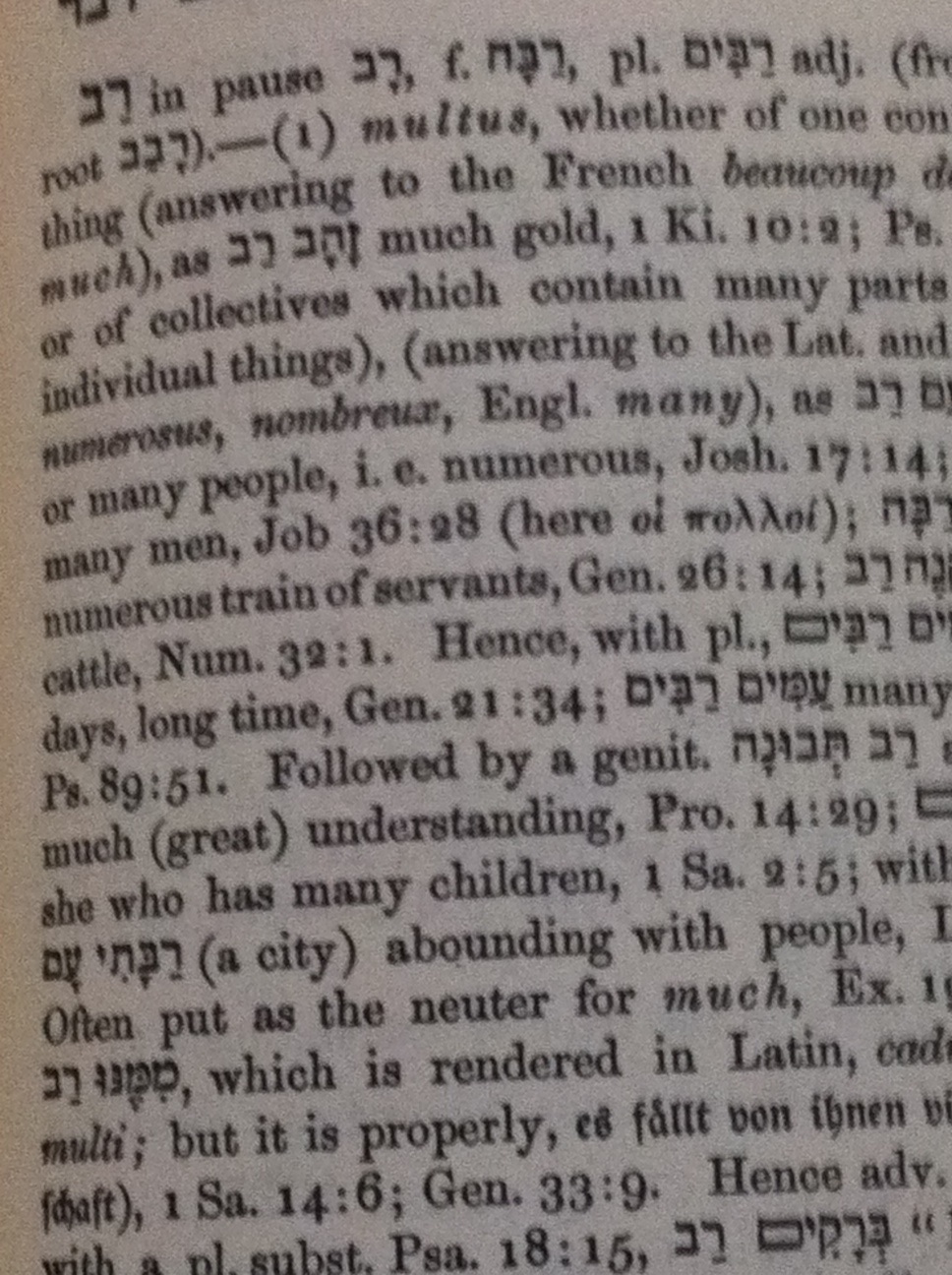
First thing to notice; THIS IS NOT A HEBREW ROOT AT ALL! It is the Hebrew WORD: רב ‘rab’ #H7227 which means, ‘many’ or ‘much,’ [notice in the lexicon it has the vowel point under the letter, “rash.” Semitic roots are consonantal ONLY!]
The triliteral (3 consonant root) for this word, is: רבב; and neither the word ‘rab’ nor its root ‘Resh-Beth-Beth,’ have anything, at all, to do with with the Hebrew word, כְּרוּב “cherub” #H3742. While there are some scholarly debates as to whether or not cherub is of a foreign origin, I have not found a scholar on this planet so inept in the linguistic field of etymology that’s willing to even suggest that “רב” or “רבב“ are the least bit plausible roots to כרוב by any stretch of the imagination.
However, The Etymological Dictionary of Biblical Hebrew, by Matityahu Clark, page 123, categorically list’s the triliteral כרב as the definitive Hebraic root.

The Analytical Hebrew and Chaldee Lexicon, by: Davidson, page 392, fully agrees with Clark’s assessment; but, also adds “etymology uncertain,” acknowledging the argument the cherub may be of foreign origin (possibly Aramaic, Akkadian, etc.) According to scholars of etymology,
the triliteral: ‘Kaph-Resh-Heh,’ is also a possibility; See: Theological Workbook to the O.T., by: Harris, who also states “The derivation of the word is dubious.”
From an etymological point of view, there is no evidence of either כְּרּב or כְּרּהִ being derived from a biliteral (2-consonant root); but if one were to consider the possibilities: Kaph-Resh is likely, also Kaph-Heh, or Kaph-Bath. It would not be Rash-Bath and would never be Resh-Aleph-Bath. However, if one were to mistake the first letter כְּ of ‘כְּרוּב’ cherub for the prefix form כְּ of word #H3588, they would be left with רובּ which is not a word that exists in biblical Hebrew in this form [confirmed in: The Analytical Hebrewe and Chaldee Lexicon, by: Davidson]. But, as a triliteral only! The Etymological Dictionary of Biblical Hebrew, by: Matityahu Clark, page 240, shows the triliteral רוּב with the concept of fight being the root of #H7232 (Gen. 49:23, Psalm 18:15), which still has nothing to do with ‘cherub.’
But I hesitate to believe that even a beginner in etymology would be capable of this type of blunder!
The actual word “cherub” can be found in, The Hebrew and English Lexicon– GESENIUS, translation by Samuel Tregelles, page 413. Please notice the definition for cherub, is cherub! Also in his translation, Mr. Tregelles states that, ‘the word etymology of cherub, is doubtful’!
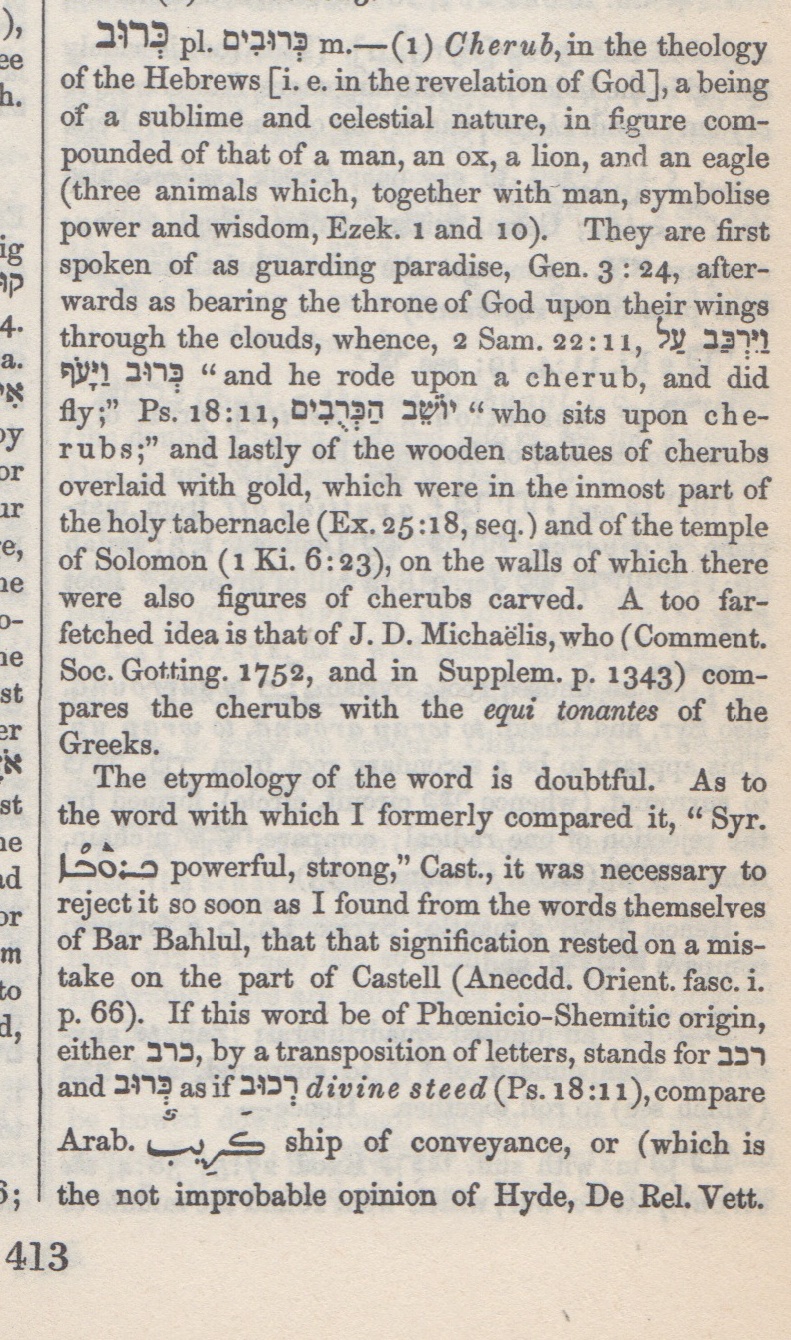
Once again to emphasize the point, according to Gesenius (who uses an Aramaic root), Tregelles states clearly: “The etymology of the word it doubtful.”
I
would like to also point out that a beginner in the basic Hebrew
aleph-bet might still confuse look a like letters such as the kaph ב =K and beth ב =B as in: “כרב” {KRB}, “by a transposition of letters, stands for, רבב” {RKB} for רבב {RBB}.
Biblical Hebrew, like every other language, has explicit rules and cannot simply be rearranged to support anyone’s private interpretations without precariously placing that fanciful interpretation securely within the realm of fabrication and as such, making it completely erroneous. An interpretation can be a legitimate teaching, unless it derived from an error! In such a case, TRUTH is not being taught.
Please notice also in the above page 753 form Samuel Tregelles translation of GESENIUS, that the definition of the word “resh-bet” has the meaning of: much, collectives which contain many parts. Mr. Hawkins, however is taking the definition of: “she who has many children”, which in this word, is referencing the reader to, 1 Samuel 2:5, not
Ezekiel 28:14. Therefore the choice of definition Mr. Hawkins chooses, has nothing to do with the word, “cherub” as found in Ez. 28:14!
So the root word definition, “resh-bet,” Mr. Hawkins uses, is found in in the text of I Samuel 2:5, but is not the word, cherub, (word–#H3742) but instead, is the word: many— #H7227 which is defined as: much, many, great. This word “many” is showing the number of children, as a collective, many. The root word Mr. Hawkins references has nothing to do with the word, cherub, #H3742; which is defined as, ‘cherub’, not many children!
The word, cherub, as found in Ezekiel 28:14 is Strong’s Concordance word #H3742 which means: an angelic being, cherub.
The Hebrew and English Lexicon translated by Edward Robinson, BDB, page 500, 501, we find the word, cherub:
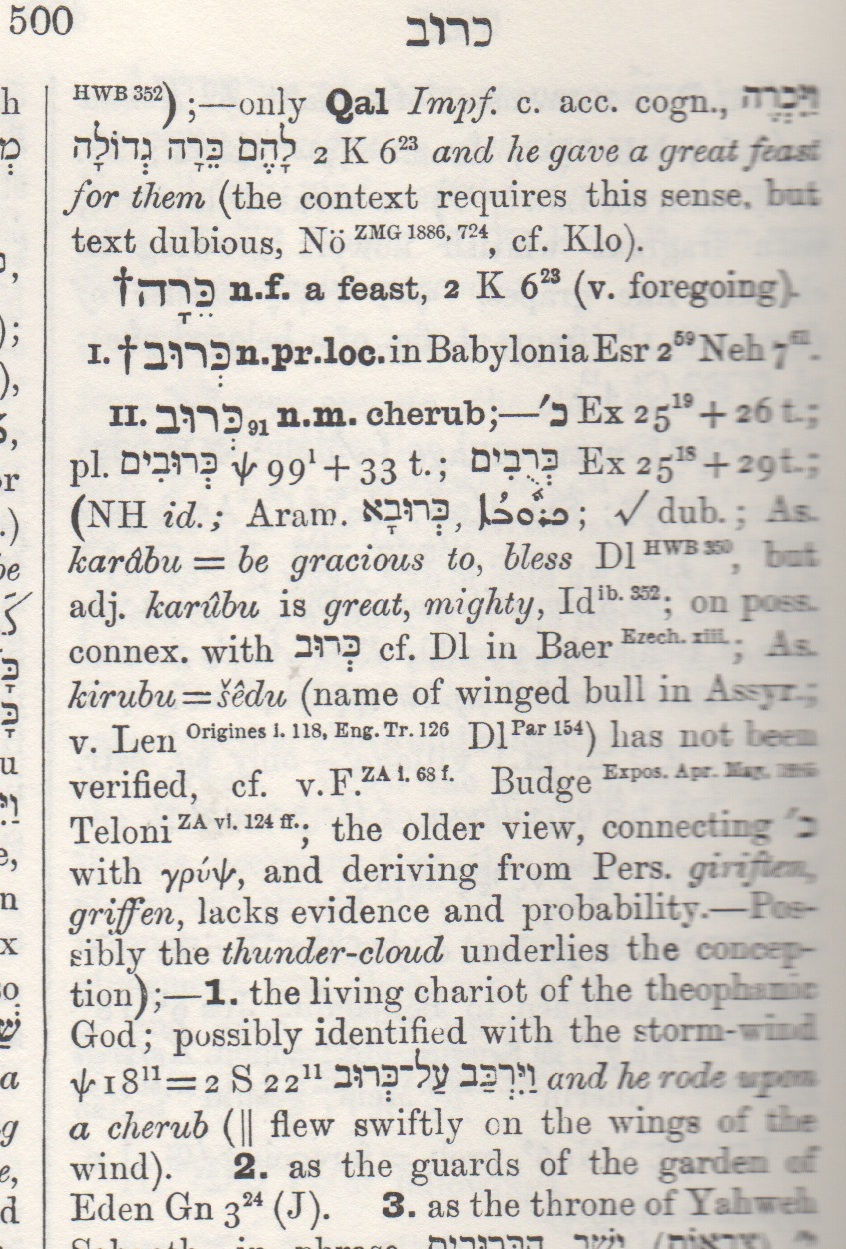
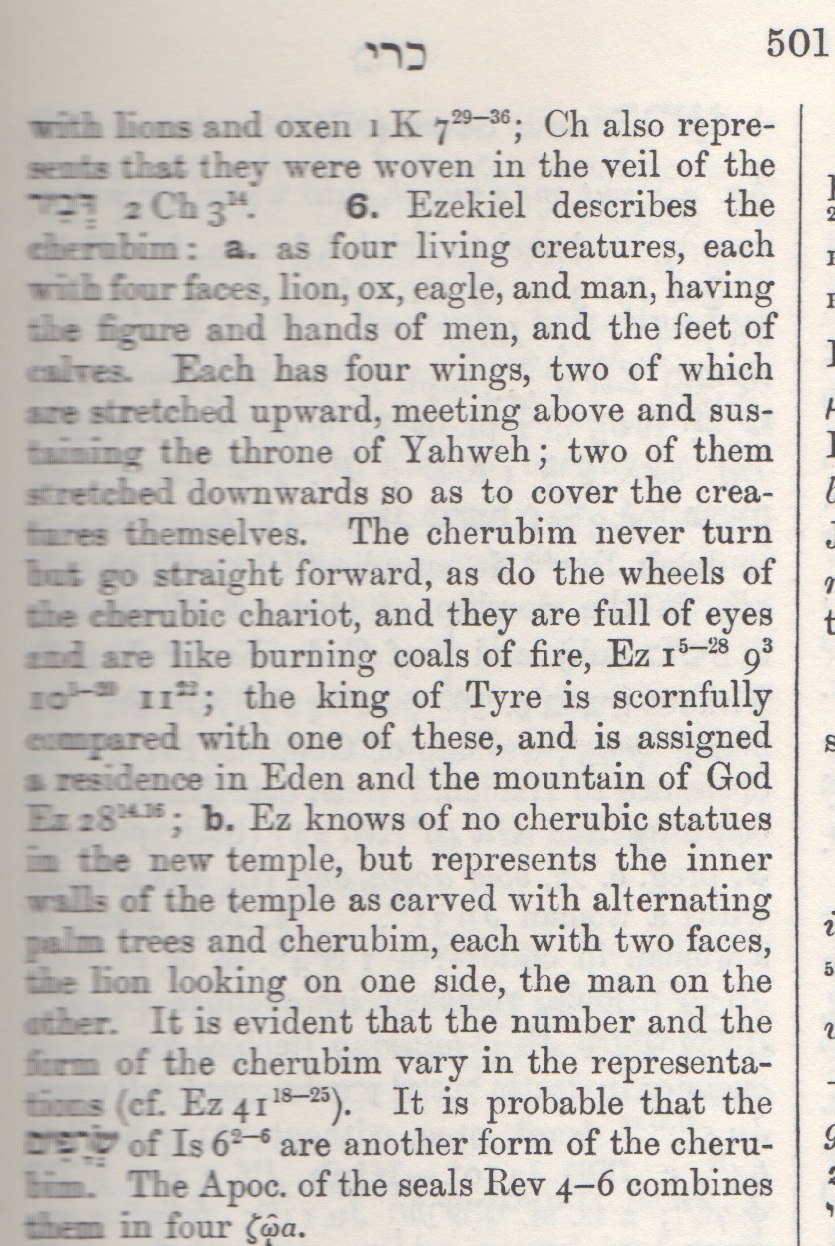
On page 500, we find that this Hebrew word, cherub, is defined as: cherub.
Please notice on page 501, that this word cherub, as used in Ezekiel 28:14 is defined: comparing the King of Tyre scornfully compared to one of the cherubim, (not him being a cherubim). And it makes no mention that this is a woman, or the ex-wife of Yahweh as Mr. Hawkins attempts to reveal in his translation. It seems he doesn’t know what a cherub is and I’ll prove my point! This is his, “Ark of the Covenant” that he has in his church, in Clyde, Texas. Below is a picture of his ark with Mr. Hawkins depiction of cherubim:
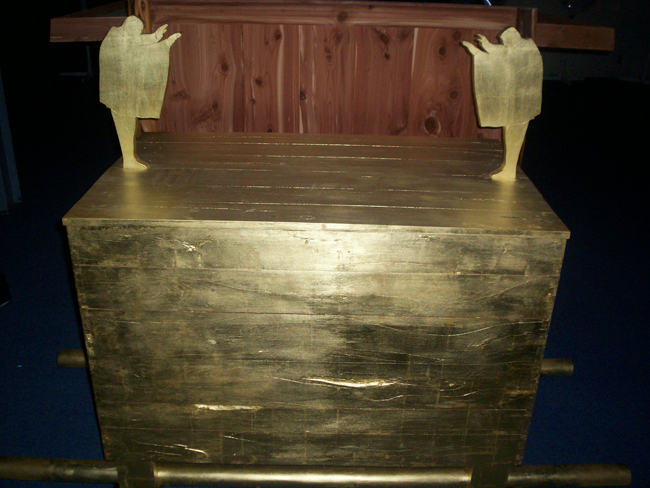
Now does that look like two men with tallits on or two cheru? I rest my case!
In this translations we find Mr. Hawkins has done the following:
THE CITY OF TYRE AND THE KING OF TYRE
Let’s examine Tyre, the King, the City, and its history!
The following commentary was written by Wayne Jackson, a well respected, bible commentator and author, from Compton, Ca. who at the beginning of his writings explains a very important principle in interpretation and translation!
An Interpretative Principle
There is an important principle of Bible interpretation that must be emphasized at the commencement of this discussion. When there is an inspired narrative that contains a significant portion of symbolism (as several biblical books do), and there is no specific historical connection within the immediate context, the conscientious Bible student must seek to determine, on the basis of a broader context, what the background of the text may be. He is not at liberty to extract, from his own imagination, an “interpretation” that is wholly alien to the historical text, or that stands in contradiction to information found elsewhere in the sacred volume.
On the other hand, when the context specifically identifies the thrust of the symbolism, the issue is settled. And it is nothing short of exegetical criminality to substitute one’s personal “expository agenda” for that which the inspired author has stated explicitly.
Tyre became the leading city of Phoenicia. The city was located in the plain of Tyre, a small region about fifteen miles long from north to south, and about two miles deep (at most) inland, on the northwestern Mediterranean coast adjacent to Canaan. Actually, Tyre was two communities — one was on the coast, another on an island about a half-mile off the coast.
About a thousand years before Christ, a Phoenician ruler named Hiram (the Great) fortified the two small islands just off the Mediterranean coast. He connected the two bodies, built harbors at the north and south, reclaimed some territory from the sea on the east, and constructed a wall some 150 feet high on the mainland side. It was a strong fortress, about two and a half miles in circumference (about 150 acres).
Though Tyre paid tribute to Assyria at times, and was assaulted by Assyrian forces on occasion, she always seemed to be resilient. In 605 B.C., Nebuchadnezzar, king of Babylon marched into Palestine and took captive the Phoenician city states, though these communities were still allowed substantial independence with their own rulers, though required to pay tribute to Babylon. At this time Jerusalem also was attacked, and a number of Jews were taken to Babylon (cf. Daniel 1:1-3). Subsequent uprisings brought Nebuchadnezzar back to Palestine. In 597 B.C. he assaulted Jerusalem again and took more hostages to Babylon, including Ezekiel. An Egyptian/Judean revolt prompted the Babylonian ruler to return to Canaan again in 586 B.C. This time he destroyed the temple, burned the city, and took more captives to Babylon.
The Babylonian king subsequently directed his attention to Phoenicia. He took Sidon and began an assault upon Tyre. For thirteen years (585-572 B.C.) he besieged the coastal city. He was able to destroy mainland Tyre, but because he lacked a navy, he could not conquer the islandportion of the community (see Ezekiel 29:17-18).
In 334 B.C. Alexander the Great commenced his ambitious project of conquering the Persian Empire. He subjugated Syria and then turned southward, down the Mediterranean coast. Sidon and some of the other coastal cities meekly submitted to the Greek warrior. Tyre, however,refused to capitulate and dug in. hope of victory was grounded in the fact that the island-city was well fortified and Alexander had no navy. Not to be out-maneuvered, Alexander decided to build road-bridge from the mainland to the island, a half-mile away. Dredging up the ruins of old, mainland Tyre, he constructed a causeway, some 200 hundred feet wide. This would accommodate his war machines to be used in battering down the eastern wall protecting the city.
Likely the conquest would not have been achieved strictly by foot soldiers. But Alexander was able to secure ships from Sidon, Cyprus, and some of his Greek allies. Thus, attacking from the east by land, and the west by sea, the brilliant young Greek commander finally took Tyre. He achieved in seven months what ebuchadnezzar was unable to accomplish in thirteen years. It is reported that 8,000 Tyrians were killed in the assault, another 2,000 subsequently executed (by crucifixion on the beach), and 30,000 were sold into slavery (Fleming, p. 64; Usher, pp. 223-226). Alexander lost only some 400 men.
The island city does not exist today. Apparently it “sank below the surface of the Mediterranean, in the same subsidence that submerged the port of Caesarea that Herod had built up with such expense and care. All that remains of it is a series of black reefs offshore from Tyre, which surely could not have been there in the first and second millennia B.C., since they pose such a threat to navigation. The promontory that now juts out from the coastline probably was washed up along the barrier of Alexander’s causeway, but the island itself broke off and sank away when the subsidence took place…” (Archer, 277). While there appears to have been some revival of the area in subsequent years, in time it was hammered over and over by invading powers (Newton, 174-175). The old Tyre, the Tyre, was but a memory. The modern Tyre (Sur) bears no relation to the ancient city that fell under the curse of Yahweh.
It is utterly amazing that several of the prophets, writing centuries before the actual events, were able to foretell the destruction of wicked Tyre. Those interested in pursuing an in-depth study of these prophecies in Isayah, Yeremyah, Ezekiel, and Zecharyah may consult the works of Rollin, Newton, and Keith. The immediate context of the ancient prophetic work clearly reveals the significance of Ezekiel 28:11-19, and there is no need to foist upon the sacred text an illusory meaning that has its basis in neither history nor sound interpretative methodology. There is no hint in this narrative of a “fall of Satan,” or a “gap” between Genesis 1:1 and verse 2. And there is no projected rise of a sinister “Anti-Messiah” who ushers in the concluding epoch of history. These notions are fantasies of perhaps well-meaning, but unsteady students of scripture.
Sources/Footnotes
King of Tyre
The king of Tyre had been appointed by Yahweh to his place of authority (v. 14). Yahweh is the ruler of all nations (Psalm 22:28), and he places the dignitaries in power, and he likewise removes them — according to their character (Daniel 2:21; 4:17; cf. Proverbs 14:34)
With glowing imagery, the ruler’s initial administration is described as analogous to “Eden,” the very “garden of Yahweh.” The illustrious regime is graphically portrayed with dazzling precious stones (v. 13). But the king’s power and riches corrupted him; unrighteousness consumed him. He became violent and egotistical. The Sovereign of the earth thus declared his impending doom, “I have cast you as profane out of the mountain of Yahweh” (vs. 15-17). The verb is a prophetic perfect. That which is certain to happen is spoken of as if it were accomplished already (Block, p. 116). The fact that Yahweh employed the “creation” (e.g., the fall of humanity) to convey these ideas should not be confused with the basic thrust of the message. There was some parallelism between the fall of , and the apostasy of this human ruler. The punishment to be inflicted upon the pagan ruler would be devastating. The city of Tyre would be overthrown and turned into ashes (v. 18). The ultimate destruction would be complete and final, striking a note of terror in the hearts of those familiar with the events (v. 19). “The idea of the city, of the spirit and activity of which the king is the embodiment, tend more and more to take the place of the idea of the king” (Davidson, p. 208; cf. v. 19 with 27:36).
King Hiram was one of the most noted of all the Kings of Tyre; he was contemporaneous with both David and Solomon, and on intimate terms with both. Like Solomon, he was much disposed to mysticism; tradition has it that the two kings often exchanged enigmas for solution. In legendary Masonry, Hiram, King of Tyre, was Grand Master of all Masons, and Hiram Abif was Master of the Order in Jerusalem. Viewing the Temple after its completion he recognized the preeminence of the Great Architect of the universe in its perfections, and yielded the supremacy in Masonry to Solomon–Yedidiyah as the representative of Yahweh. In the symbolic supports of Masonry he represented the pillar of strength, because, “by his power and wealth he assisted the great undertaking.” Legendary Masonry represents him as frequently visiting Jerusalem for consultations with Solomon and the chief architect Hiram Abif during the construction of the Temple. Formed friendly alliance with David… — ( 2 Samuel 5:11 ) — Supported Solomon in the building of the Temple… — ( 1 Kings 5:1-11 ) — Supplied workmen and material for the construction of the Temple… — ( 1 Kings 9:26-28 – 2 Chr. 2:3-16 ) — Refused 20 cities to him by King Solomon… — ( 1 Kings 9:10-12 – 2 Chr. 8:1,2 )
Tyre’s principle temples were dedicated to Melqart and Astarte. King Hiram instituted a yearly celebration every spring of the death and rebirth of Melqart. Hiram called this Melqart’s “awakening” and it represented the death of nature during the winter and its rebirth in the spring. It’s believed that Astarte played some role in Melqart’s resurrection, perhaps through a ritual marriage.
We can see that the city of Tyre and its Kingdom was prophesied to fall! It was a mighty kingdom made rich by its sale of purple dye and being a
major seaport, much like Houston, Texas is a major seaport here in the United States today! Tyre’s kingdom is an example to all nations of what occurs when you exalt a man, instead of giving the honor to Yahweh. In Ezekiel the 28th chapter we are shown the eventual destruction of a kingdom and a king who exalted himself, instead of Yahweh. It is apparent from history, that the King of Tyre, was blessed for contributing and doing his part in the work of Yahweh. But instead of acknowledging Yahweh, he exalted himself! This chapter in Ezekiel, is dealing with a mighty man, not a spiritual being! It should be an example to any nation and to their leaders, to never think that they have any place of power, without Yahweh giving it to them!
YISRAYL HAWKINS USAGE OF “MARRIED” IN THIS TEXT
The next word we will examine in Ezekiel 28:14, is Mr. Hawkins inserted word “married,” into the text!
In his footnotes in The Book of Yahweh, 10th edition, page 649, 2b, we find the following explanation for his insertion of the word “married,” into Ezekiel 28: verse 14;
BOY–Verse 28:14–Hebrew root word, “nathan”. Traditionally translated “set you so”. A Hebrew and English Lexicon of the Old Testament by Brown, Driver, and Briggs, Page 678, shows this word is correctly translated: “to give a woman as a wife,” meaning: “to marry.”
As in most of Mr. Hawkins translations, he uses lexical references, but his ignorance of how to use their works, is apparent when taken under careful, further scrutiny. It is of utmost importance that one examines, his usage of defining words, and to examine the books he uses in constant reference, in his translation! This writer has caught him referencing the wrong page of a lexicon, or concordance, to prove his points (Ex: his Exodus 15:3 translation)! Other times he will
choose the wrong information instead of the actual definition. As in this case, he inserts the context, “to give a woman as a wife, (Gen.29:28) which never means, to marry,” (if you were to give your daughter as a wife, would you marry her?) In this context this word has nothing to do with marrying, but is an example of different things you can give, put, or set: (Ex: Gen. 29:28 to give a daughter to a man!) the lexicon also shows you can give a woman a bill of divorce (Deut. 24:3)! The Hebrew and English Lexicon–GESENIUS, as translated by Edward Robinson, by Brown, Driver, and Briggs, page 678 is a fine example of Mr. Hawkins choosing the wrong information on a word, in this case, “nathan.”
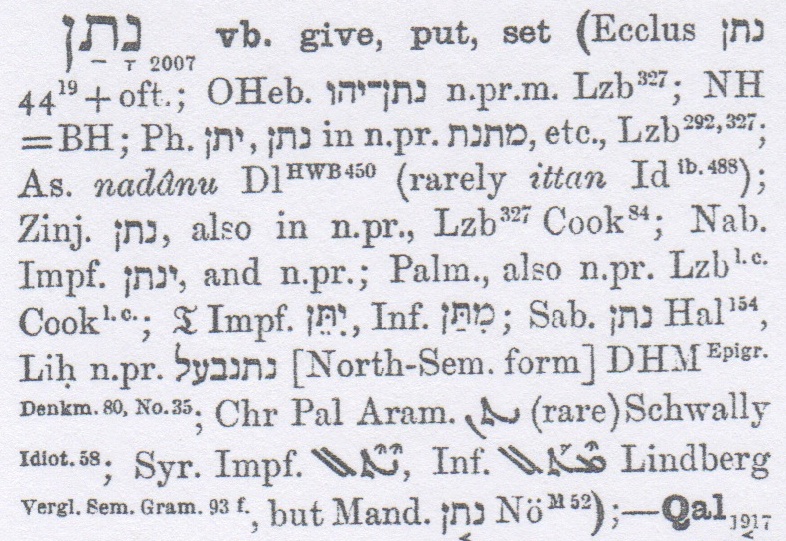
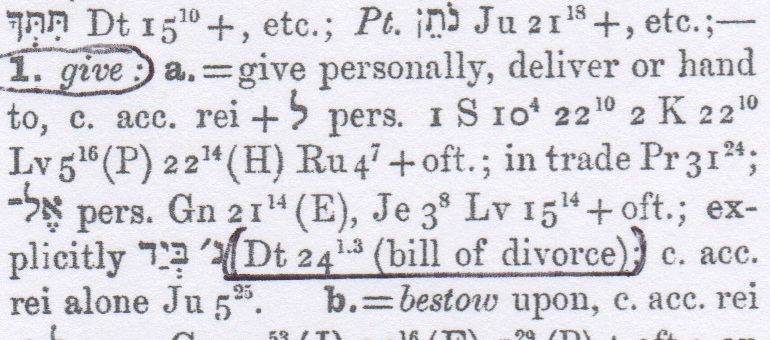
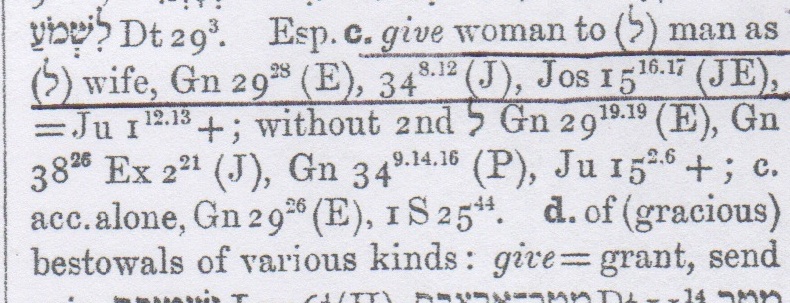
As we have stated in previous articles, in order to interpret Hebrew words, you can’t pick and choose the definition you like. You have to find the word, in its scriptural context! This definition of “give woman to man as wife; to marry” is not in context with the Hebrew word, “nathan” which is not defined as such, in this passage of Ezekiel 28:14!
The words, “have set” from Ezekiel 28:14 is found in Strongs Concordance which is word #H5414, which means: (verb) to give, put, set.
In The Hebrew and English Lexicon as translated by Edward Robinson, BDB, page 678 we find the following hebrew meaning of “have set”:
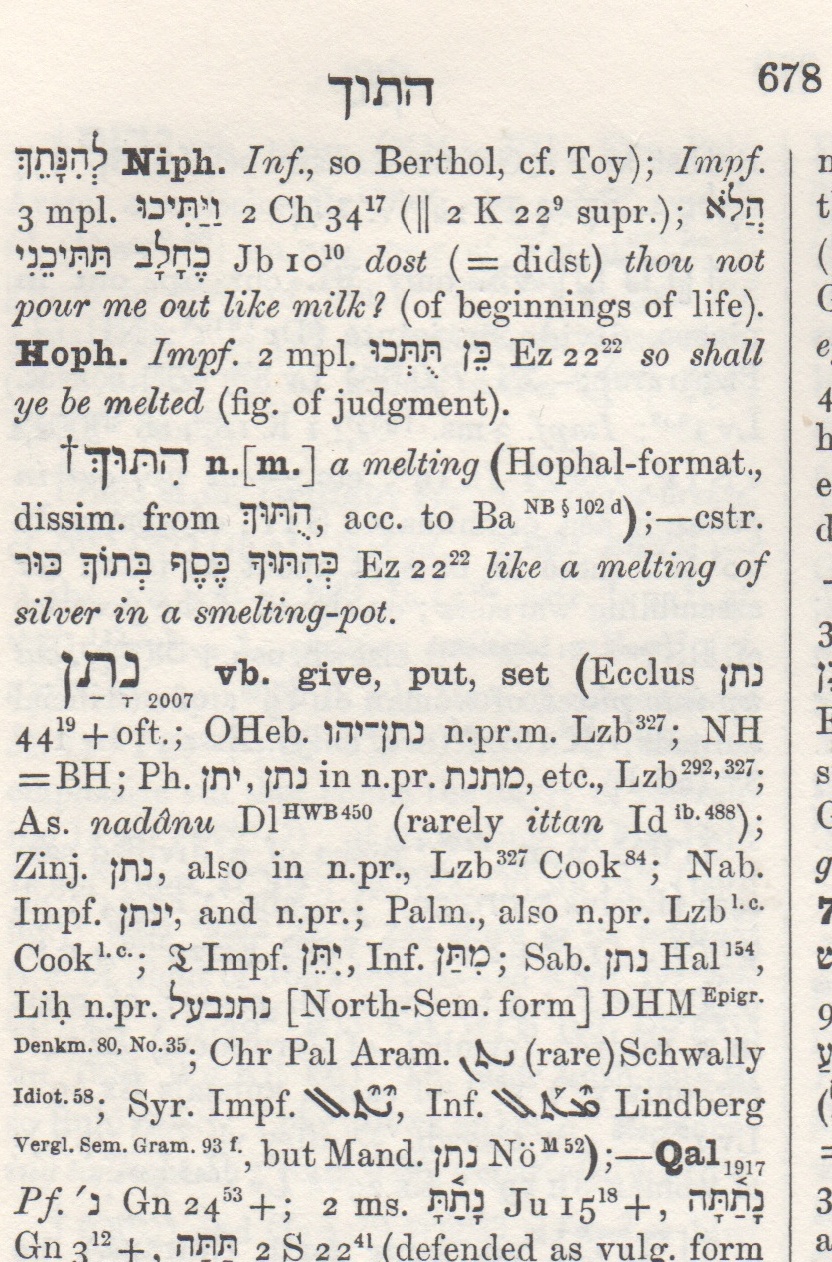
If you examine this word, copied above, in the Lexicon by Brown, Driver, and Briggs, you will not find this word, “have set,” defined as meaning: to marry, in context with Ezekiel 28:14! As you can see in this definition of the Hebrew word, “nathan”, this word is a verb: meaning–give, put, set. So in the case of the King of Tyre, Yahweh placed, put, or set him, in power, as He does all the Kings of the earth! Mr. Hawkins interpretation of ‘give’, like giving a woman in marriage, to marry; is taking the word, “nathan,” way out of context.
There are many scholars who have examined this scripture and have come to a consensus of interpretation, as to the cherub, and its representation with the King of Tyre. Below is a few commentaries on Ezekiel 28:14:
Gill’s Exposition of the Entire Bible
Thou art the anointed cherub that covereth,…. In allusion to the cherubim over the mercy seat, which covered it with their wings; and which, as the ark of the testimony and all the vessels of the tabernacle were anointed, were so likewise; in all probability the king of Tyre is called a “cherub” because of his wisdom and power; “anointed”, because of his royal dignity; and “that covereth”, because of his office, which was to protect his people; all which he either was, or ought to be, or was in his own opinion so: antichrist makes great boasts of his wisdom, power, and authority, as a teacher, pastor, or bishop, the cherubim being symbolical of the ministers of the word; and of his being anointed by men, that he may be the cover and shield of the church; and of his being the Lord’s anointed, and the vicar of Christ, and head and protector of the church, as he calls himself (s). The Targum understands all this of regal power, and renders it, “thou art a king anointed for a kingdom:”
Jamieson-Fausset-Brown Bible Commentary
14. anointed cherub-Gesenius translates from an Aramaic root, “extended cherub.” English Version, from a Hebrew root, is better. “The cherub consecrated to the Lord by the anointing oil” [Fairbairn].
covereth-The imagery employed by Ezekiel as a priest is from the Jewish temple, wherein the cherubim overshadowed the mercy seat, as the king of Tyre, a demi-god in his own esteem,
extended his protection over the interests of Tyre. The cherub-an ideal compound of the highest kinds of animal existence and the type ofredeemed man in his ultimate state of perfection-is made the of the king of Tyre, as if the beau ideal of humanity. The pretensions of Antichrist are the ulterior reference, of whom the king of Tyre is a type. Compare “As God . in the temple of God” (2Th 2:4).
Barnes’ Notes on the Bible
Thou art – Better,” Thou” wert. “the anointed cherub that covereth” In the temple the cherubim and all holy things were consecrated and anointed with oil (Exodus 30:26 ff). The prince of Tyre was also anointed as a sovereign priest – covering or protecting the minor states, like the cherubim with outstretched wings covering the mercy-Seat. Thou wast upon the holy mountain – As the cherub was in the temple on the holy mountain, so the prince of Tyre was presiding over the island-city, rising like a mountain from the deep.
We can see in all these respected commentaries that the “cherub” mentioned here has nothing to do with Satan, Lucifer, or marrying Yahweh! In fact, there isn’t a well respected hebrew scholar who has come up with such a conclusion.
Ezekiel 28:2–MAN
I would like to turn your attention to the choice of replacing words in text. Mr. Hawkins utilizes this technique, in order to get his readers minds to follow a path of his personal understanding and slanted view in his translation. We will examine the word “man” in Ezekiel 28:2 as a perfect case of Mr. Hawkins choice of, picking definitions, to prove his theories in translation.
The Interlinear Bible by Jay Green, page 659:
Ezekiel 28:2 “Son of man, say to the ruler of Tyre. So says the Lord Jehovah, because your heart is lifted up, and you have said; I am a god; I sit in the seat of gods, in the heart of the seas, yet you are a man, and not God, though you give your heart as the heart of gods.”
The Book of Yahweh, 10th edition, page 649:
Yechetzqyah (Ezekiel) 28:2 “Son of man, say to that prince of Tyre; This is what Father Yahweh says; Because your heart is lifted up, and you have said; I am a god;I sit in the seat of a god,in the midst of the seas, I (Yahweh) therefore say to you; Yet you are a created being, and not the Almighty, though you set your heart to be the Almighty.”
If you notice the word, man, is underlined in both translations so you can see what is being changed in Mr. Hawkins translation. In his passage, he replaces the word “man,” in the second usage of verse 2, with “created being.” This word “man” is #H120, adam, defined: man, mankind; is defined as such throughout this chapter! In The Hebrew and English Lexicon, as translated by Edward Robinson, BDB, page 9, we find:
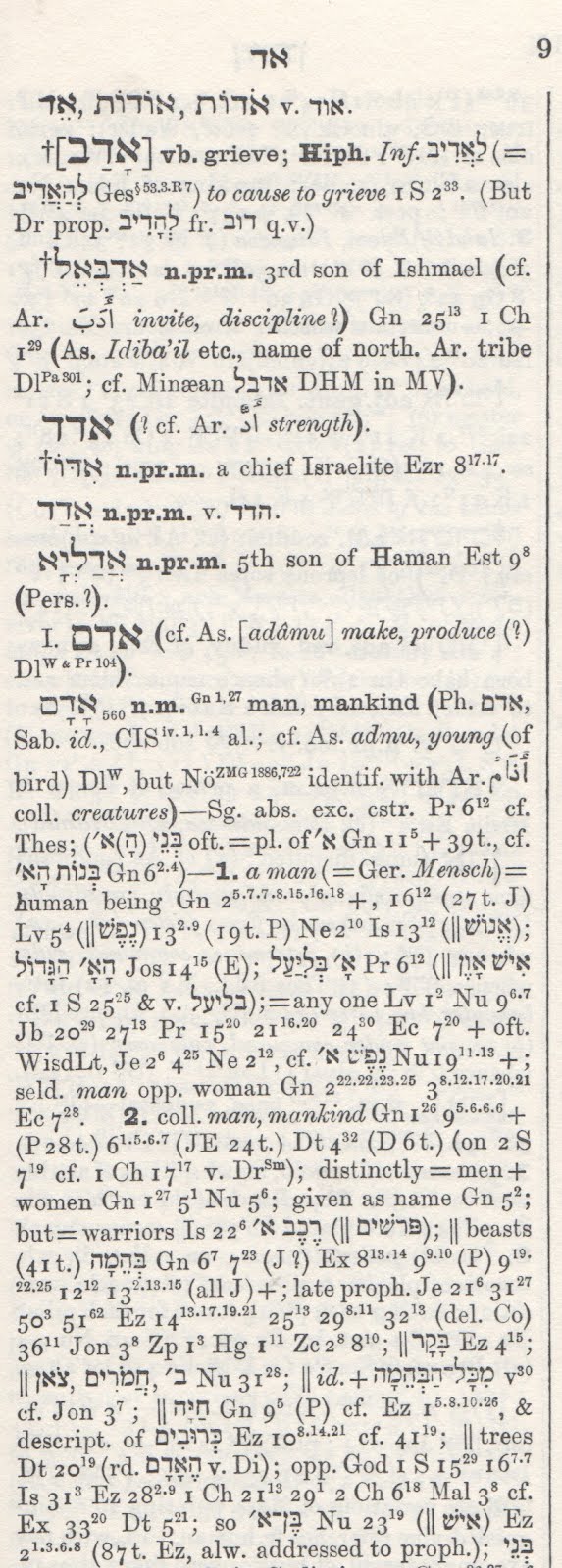
Notice the word “adam” as referenced here is defined as man! It is also used in “opposite, as opposing contrast to Yahweh.” In this case in Ezekiel 28:2,9, this word is defining a man, not a spiritual being, in opposite comparison to Yahweh! So this man, (not a cherub) is in opposite contrast with Yahweh. It is a man, not a spiritual being! And one thing definitely out of place is this man is not marrying anyone on the mountain!
Here is another commentary on this scripture:
Ezekiel 28:2 Son of man, say unto the prince of Tyrus, Thus saith the Lord GOD; Because thine heart is lifted up, and thou hast said, l am A God, I sit in the
seat of God, in the midst of the seas; yet thou art a man, and not God, though thou set thine heart as the heart of God:
Specific reference to ‘yet thou art a man‘. First we have to realize that Yahweh never created satan, satan is a hebrew word and nothing else. “shtn” means adversary when translated to english (not a proper noun), so we really have to read what this chapter says about the King of Tyre from this angle. Also this is an inferred situation, satan, devil or lucifer is never mentioned here. When a word or phrase is repeated it is for emphasis sake. The author is saying, pay special attention to this, it has huge relevance! This scripture states without a doubt, that this King of Tyre, “is a man!”
CONCLUSION
In this writer’s review of Yisrayl Hawkins attempted translation of Ezekiel 28:14, one finds another example of his elementary, proof text approach in explaining the Hebrew language in translation. This work only emphasizes why bible translation should be left up to those trained in biblical Hebrew language, linguistics, semantics, and grammar. Yisrayl Hawkins and his colleague, David Verners attempt to translate biblical passages, is a classic example of undisciplined hermeneutical writing! I would recommend that Mr. Hawkins and his colleagues study the books, “Introduction to Biblical Hermeneunetics, the Search for Meaning by Walter Kaiser and Moises’ Silva and Exegetical Fallacies, by D.A. Carson,” before attempting to translate any more scriptures.
In review of Ezekiel 28:14 here are 5 points to consider:
Most readers know the truth and history of scripture, therefore Mr. Hawkins should be careful in leading them astray as Yahweh’s message is consistent. If the word of Yahweh is corrupted by the ignorance and inconsistencies of human beings, it is no longer the word of Yahweh! Mr. Hawkins pits one part of scripture against another, and interpretsdetails of scripture in a way that undermines its basic message.
A satisfactory interpretation of the bible passages requires a submissive predisposition. The desire to keep the Torah, the determination to do Yahweh’s will; this is the great prerequisite for true biblical understanding! Mr. Hawkins and his colleague Mr. Verner, need to study biblical hermeneutics, which would help them greatly, but I fear these two have an agenda which is not in eruditon of scripture. But they have in this text as well as others that this writer has reviewed,
consistently led their readers to a personal scriptural perspective, that seems to ensnare a certain kind of biblical student. There are bible students who may be impressed by this different theological explanation of scripture, which goes against the flow of mainstream biblical hermeneutics, and it seems Mr. Hawkins is preying upon this type of person!
In this critical exegesis of Mr. Hawkins translation of Ezekiel 28:14, I must emphasize his improper and inadequate usage of lexical, grammatical, cultural, theological, historical, and geographical knowledge to justify his translation, which only alienates a serious evolving, bible student from adopting a respectable position on his works. He has only left this reader with two questions of this work:
1. What is the real purpose of his translation of Ezekiel 28:14?
2. Who are the scholars who have put their names to his translation to say “it is the closest to the Hebrew language of any other translations?”
It seems he is attempting to transfer the authority of scripture into his interpretations, as in the majority of his translation of biblical text. His constant catachresis of lexical, scholarly works only re-enforces his error and ignorance to the serious bible student, who should be proving all things and rightly dividing the word of truth! While in this world, we may not all agree with scriptural interpretation, I find it hard to believe that there is any
creditable theological school, professor, or scholar who would find this interpretation of Ezekiel 28:14 as Mr. Hawkins boasts, “the closest to the Hebrew language, of any other translation of the bible!”
ABILENE, TEXAS-THE PLACE WHERE YAHWEH WILL ESTABLISH A HOUSE OF YAHWEH?: A DOCTRINE CREATED BY YISRAYL HAWKINS, BUT NOT
ACCORDING TO BIBLICAL TEXT!
“ASK AT ABEL”
by Kepha Arcemont
Not many people have heard this term, “Ask at Abel,” but there is one religious group in Clyde, Texas, a corporate, HOUSE OF YAHWEH, that has made this term, a central theme for their religious dogma. While I am not one to discredit religions, as everyone has the right to worship where they want, and with whom they want, I find it necessary to bring forth to the sacred name believers, any group who uses the father’s name in vain. This is in direct violation of the commandment, which states, “Do not bring Yahweh’s name to nothing.”
Anyone who is serious about the faith, and is continuing their growth in learning how to serve Yahweh, will come to a point, where they discover not just the name of Yahweh, but what it truly means to serve Yahweh. It is at this point we graduate from the elementary principles of doctrines. We go from milk to meat. Since I was a part of a HOUSE OF YAHWEH, in Clyde, Texas, it is with true belief and zeal for Yahweh, that I now must expose the most evil deeds of this sacred name group, who brings the name of Yahweh to nothing. That is a strong statement, and to say such a thing would require solid proofs. You will find those proofs here in this review of Mr. Hawkins work! I will not judge this groups leadership from a personal viewpoint, for Yahweh is judging that aspect. He is
revealing their breaking of His laws, which is a serious violation against Him. When one does such a thing, they bring in damnable heresies and confuse those who are seriously wanting to know the truth of Yahweh. When Yahweh’s name is used, He takes notice of those who use, or misuse it!
I have found through much research and examination that this group, has violated the most sacred of Yahweh’s laws. To not add to, or take away from the word of Yahweh! This has been done in so many ways, that they now have built religious dogma on the words of one man. The majority of the
members associated in this church, have stated to me, he can never do wrong, or sin! They have stopped doing what the Apostle Shaul instructed, “Study to show yourselves approved, and prove all things!” These two statements by the Apostle Shaul, a man of Yahweh, was necessary for those who in his day, were encouraged to investigate and study the words of Yahweh. These holy words in their original intention, have been lost through translation and transcription, by scribes and interpretors. It is up to the true researcher to restore them back to their original intent! This is the purpose of this work!
So here we have today, a fifth grade level Pastor of one of the largest sacred name groups in America, professing to be a Hebrew/Greek scholar and interpreting the Holy Scriptures, unlike anyone before him! I have concluded that even King James didn’t make as many errors in translation as Mr. Hawkins has! While this is a bold statement, I think that as time goes on in the research and review of his translation and interpretation of scripture, we will find my
statement to be completely true! At this time it is reported that I am considered one of their most feared enemies, that the corporate, HOUSE
OF YAHWEH, has encountered. I consider this to be an honor if they persist in their ways of deception. While I offer them a Covenant of Peace, it will be up to them to accept this humbly and through repentance, if they have any hope of redemption. I have had to think seriously about my well intentions and what I describe as ‘righteous indignation’ against Buffalo Bill Yisrayl Hawkins and his entourage of Buffalo believers, called Kahans, and Kohannahs. He has amassed an army of loyal Buffalo worshipers, who have pledged their loyalty to this man without waver. I am fully aware of their capabilities and have considered the cost of going against the most evil man I have ever encountered. While it would be easier for me to just go on my merry way and forget that he ever existed, I can’t do this, as this would be a dishonor to Yahshua Messiah, and to my Heavenly Father, Yahweh. Also, this would be a dishonor to many brothers and sisters, who are depending on someone to take a stand against evil! I know that there are many in this corporate, HOUSE OF YAHWEH, who are praying for a
day of redemption from Yahweh, and it is only Yahweh who can free them from the deception they now are under!
This article will tackle one of BBYH most liked doctrines. The belief that his group is ‘Abel’, or related to Abel. His false prophets brag that they are part of the oldest religion on earth, which was founded by Abel, the first righteous priest of Yahweh. This doctrinal belief is based on HIS TRANSLATION AND INTERPRETATION THEORY; because he founded his church in Abilene, Texas. He has convinced his congregation that the name of this city, is
named after the first righteous Priest, Abel, and that this is the modern day Abel, or Jerusalem! While I have no problem with the naming of Abilene, Texas, I find no solid biblical text to back up Mr. Hawkins theory. Let’s examine Abilene’s origins and see just exactly how this city got its name and whether Mr. Hawkins theory is worthy of merit!
ABILENE, TEXAS
Abilene
( /ˈæbəliːn/ AB-ə-leen) is a city in Taylor and Jones counties in west central Texas. Established by cattlemen as a stock shipping point on the Texas and Pacific Railway in 1881, the city was named after Abilene, Kansas, the original endpoint for the Chisholm Trail. The T&P had bypassed the town of Buffalo Gap, the county seat at the time. Eventually, a landowner north of Buffalo Gap, Clabe Merchant, known as the father of Abilene, chose the name for the new town. According to a Dallas newspaper, about eight hundred people had already begun camping at the townsite, before the lots were sold.
Clabe Merchant, known as the father of Abilene, reportedly chose the name for the town. Appropriately enough for a town that enjoys its religious reputation, Abilene is mentioned in the Bible. In the third chapter of Luke, a mid-Eastern tetrarchy is named Abilene, which means “grassy plain.” However, when the town was named, it was named after Abilene, Kansas, in hopes that it, too, would become a great cattle-shipping point.
In 1874 he moved his cattle to Callahan County, where he and his partner, Jasper McCoy, established the 74 Ranch near Belle Plain. In the late 1870s, when the railroads began to inquire about expanding into neighboring Taylor County, Merchant attempted to purchase land near the site of present-day Abilene. In August 1880 at John N. Simpson’s Hashknife Ranch he bought 1,700 acres in what later became central Abilene. In December 1880 a meeting was held that resulted in a contract between the cattlemen and the railroad. At this meeting Merchant gave the town the name Abilene, after the cattle-shipping center in Kansas, and earned for himself the nickname “Father of Abilene.” He moved his family to Taylor County in 1882 and the following year constructed an elaborate rock house in the 1200 block of Merchant Street in Abilene.
Abilene, Kansas- Abilene is a city in and the county seat of Dickinson County, Kansas, United States. Abilene began as a stage coach stop in 1857, established by Timothy Hersey and named from a passage in the Bible, meaning “city of the plains“. (remember this definition when we examine the biblical cities named, “Abel!”) The town grew quickly when Joseph G. McCoy decided to use the town for the location of his stockyards. Abilene became the very first “cow town” of the west.
Timothy Hersey, at about 10 years of age, Hersey moved with his parents to Northern Illinois and a few years later to Beloit, Wisconsin. As a young man he went to Jo Daveiss County, Illinois, where he was married January 18, 1852, to Eliza E. Johnson. They lived there until 1857 when he went west to what is now Abilene, Kansas. His wife and two small children followed him the next year. Hersey had laid out a town and his wife received the honor of naming it, calling it Abilene. Hersey was the second white settler in Dickinson County and their daughter, Sylvia, was the first non-native child born in Abilene.
Abilene began as a small prairie village along the Smoky Hill Trail. It was platted at the east side of the crossing of Armistead Creek in 1861. Following the entrance into the Civil War the name of the creek was changed to Mud because its namesake had joined the Confederate forces. The name of Abilene was chosen from a verse in the New Testament, (of a place in Syria), meaning, “City of the Plains”. For six years, the settlement had little resemblance to a city, being just an assemblage “of a half dozen huts”.
We can see that if Yisrayl Hawkins was given a directive by Yahweh, to establish his church according to a specific named biblical city, and that city was to be the place where the work of Yahweh should be founded, then he should have established, or relocated his church, to Abilene, Kansas. If Abilene was the city of importance that Yahweh named in America, then it should have been the first one named Abilene! The city Abilene was named after the New Testament passage where Abilene is mentioned in Luke 3:1, Abilene, Texas was named after Abilene, Kansas. This is according to the written records. So should the name of a city be of importance as to where we can find Yahweh? Keep in mind, the biblical Abilene, was in Syria, not Israel!
We know that Jerusalem is the city that Yahweh placed importance upon, because it was where he had his physical house here on earth. But since 70 a.d. there has never been a physical House of Yahweh, built according to Yahweh’s specifications and patterned according to His laws. Did any city named Abel within the territory of Israel, or Abilene, Syria have a physical House of Yahweh? Not according to any historical or biblical records! Let’s examine the word Abel, to see if we should be looking for a city named Abel, or Abilene in order to find Yahweh or an established House of Yahweh!
ABEL BETH MAACAH
In II Samuel 20th chapter, we read of a story about a man, named Sheba. We don’t know a lot about this man, but being a Benjamite, it is most likely he was an
adherent of King Shaul’s dynasty. He must have been someone of importance and power, otherwise how could he have raised so sudden and extensive a sedition against King David? It is most likely he did not like the rise of the tribe of Yehudah under King David, his ill, designing heart resolved to turn it to the overthrow of David’s authority in Israel. In verses 14,15 we find the following:
“Sheba crossed through the tribes of Israel to Abel beth Maacah and all of the Berites gathered together and followed after him. Joab came and besieged against him in Abel beth Maacah. They built a siege ramp up to the city, standing against the outer fortified wall; and all the troops with Joab were battering the wall to bring it down.”
The word Abel as mentioned in this scripture, found in Strongs Concordance is word #H59 from #H58 which means: a grassy place, a pasture, meadow. In Gesenius Hebrew and English Lexicon, BDB, page 5, we find this word to mean: to be wet with the moisture of grass; frequently used of geographical names.
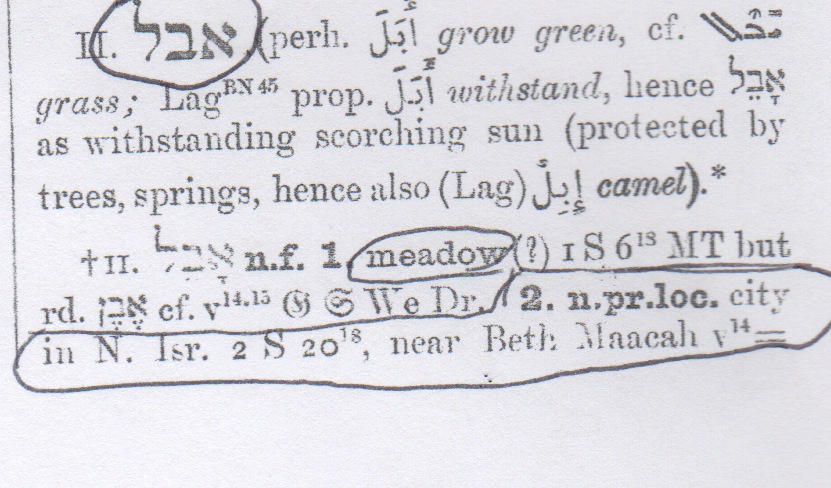
Beth Maacah is word #H1038 which comes from #H1004 and #H4601 which means: house of pressure; a place in the northern kingdom. Word #H4601 means: oppression; a town and region at the foot of Hermon, near Geshur, a district of Syria.
So we can see this city taken from the Hebrew word: אבל “aleph-bath-lamed” which as translated in this scripture in (II Samuel 20:14,15,18), means a city which is in a grassy place, a meadow. This word ‘abel,’ as used here is not the name of the Priest Abel whom we find in Genesis!
ABEL, A MOTHER CITY IN
ISRAEL
In II Samuel 20:19, we find that this was a mother-city in the land of Israel!
II Samuel 20:19 “We are peaceful and faithful in Israel. Yet, you are trying to destroy a mother city in Israel. Why would you swallow up an inheritance of Yahweh?”
The word mother city means a metropolis or major city in the land of Israel. Many commentaries on this scripture shed insight, as to what law was being kept that day, a Covenant of Peace was upheld according to the Law of Yahweh!
In Commentary Critical and Explanatory on the Whole Bible by Jamieson, Fausset and Brown, page 208 we find the following commentary:
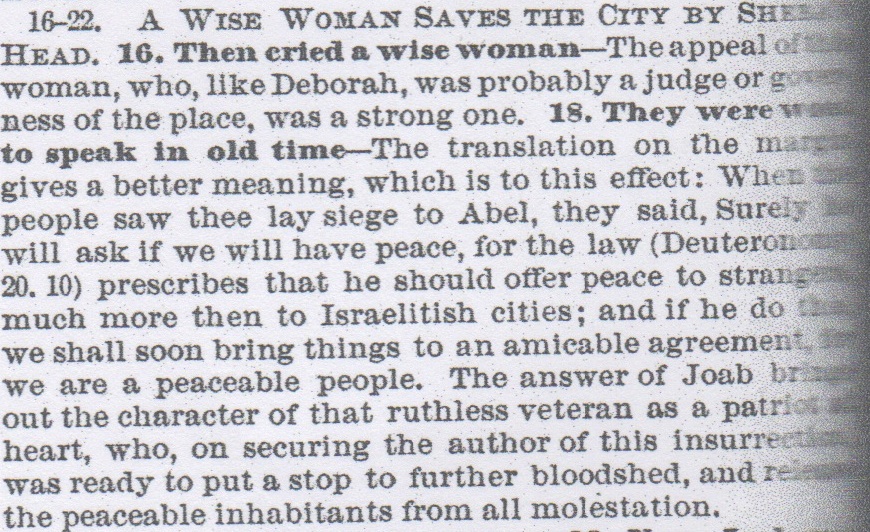
Notice that when the people saw that the General of David’s army was besieging the city, they reminded Joab of the Law of Yahweh, found in Deuteronomy 20:10, where peace was to be offered to strangers, much more than to an Israelite city! When Joab was reminded of Yahweh’s law, and the woman (it appears she was the governor of the city, or someone of importance) whom Sheba obviously deceived when coming into the city, was given to
Joab, there was no bloodshed done to this city!
Other notable commentaries on this scripture reveal the following information:
Barnes’ Notes on
the Bible
This was an old proverb. Abel, like Teman, and some other places, was once famous for the wisdom of its inhabitants 1 Kings 4:30-31. The wise woman was herself a remnant of this traditional wisdom.
Clarke’s
Commentary on the Bible
They shall surely ask\ counsel at Abel – This is a proverb, but from what it originated we know not; nor can we exactly say what it means: much must be supplied to bring it to speak sense. Abel was probably famed for the wisdom of its inhabitants; and parties who had disputes appealed to their judgment, which appears to have been in such high reputation as to be final by consent of all parties.
To this the wise woman refers, and intimates to Joab that he should have proceeded in this way before he began to storm the city, and destroy the peaceable inhabitants.
Gill’s Exposition of the Entire Bible
Then she spake, saying, they were wont to speak in old time,…. It was a common saying, a proverbial expression among the ancient sages: saying, they shall surely ask counsel at Abel, and so they ended the matter. Abel, it seems, had been a city so famous for wise and prudent men, that it was common for the inhabitants of other cities, in the several parts of the kingdom, when any controversy arose among them, to say to one another, since we cannot agree this matter among ourselves, let us go to Abel, and take advice there, and leave it to their arbitration; and so they did, and things were presently brought to an issue, and happily concluded; nay, when the king had a mind to make a decree or law, as R. Isaiah observes, he used to send to Abel to know whether they would submit to it; and if they agreed to it, then he proceeded in it; for other cities followed their example, so famous was this city, and of so great account: now the woman argues from hence, that surely such a renowned city should not hastily be destroyed; but the Targum directs to another sense, and which perhaps is best, and is followed by Jarchi, Kimchi, and others, paraphrasing the words thus,”she spake, saying, I remember now what is written in the book of the law, to ask a city first, saying, (will ye make peace?) so shouldest thou have asked of Abel, will ye make peace, or receive terms of peace?”referring to the law in Deuteronomy 20:10; signifying, if that had been attended to as it ought (for if such methods were to be taken with Heathen cities, much more with a city of Israel, as Abel was), things would soon have been agreed and issued; had Joab upon approaching the city proposed his terms of peace, they would have immediately yielded to them, and so the matter would have ended at once; for they were a peaceable people, as it follows: though Dr. Lightfoot (b) gives another sense of these words, that Sheba and his party when they came to the city,”they at first certainly said thus, that they would ask Abel of its peace (or on whose side it was), and so they made the matter entire, or made a show of their own integrity:”by which this woman assured Joab, that the men
of Abel had not invited, nor willingly received Sheba and his rebels into the city, but they had deceived them by fawning and false words, pretending only to inquire about the peace and welfare of their city.
Geneva Study Bible
Then she spake, saying, {l} They were wont to speak in old time, saying, They shall surely ask counsel at Abel: and so they ended the matter. She shows that the old custom was not to destroy a city
before peace was offered, De 20:10,11.
Matthew Henry’s Concise Commentary
20:14-22
Justly is that place attacked, which dares to harbour a traitor; nor will the heart fare better which indulges rebellious lusts, that will not have Christ to reign over them. A discreet woman, by her prudent
management, satisfied Joab, and yet saved the city.
Wisdom is not confined to rank or sex; it consists not in deep knowledge; but in understanding how to act as matters arise, that troubles may be turned away and benefits secured. A great deal of mischief would be prevented, if contending parties would understand one another. Let both sides be undeceived. The singlecondition of peace is, the surrender of the traitor.
It is so in God’s dealing with the soul, whenbesieged by conviction and distress; sin is the traitor; the beloved lust is the rebel: part with that, cast away the transgression, and all shall be well. There is no peace on any other terms.
What is most interesting about the reviews of the text, is that Abel was a place of judgment where a matter of controversy could be settled! In 23 years of being at a corporate church, called HOUSE OF YAHWEH, and now have been outside its gates for many years, I have not seen any matter of judgment settled! So HOUSE OF YAHWEH, since you consider yourself Abel, can you settle the matters set before you concerning the mistranslation of scripture that I am accusing you of causing deception? I would like your translation of Exodus 15:3, Daniel 12:1, Ezekiel 28:14 to be compared with the review of those translations, in which I disagree with your deceptive translations. Can you explain, through comparison of my review, and prove the review incorrect, by using authoritive sources and factual information? If you can’t, will you correct your translations? Let’s see if your Abel does as the Ancient Biblical Abel’s did!
CITIES
NAMED ABEL
These commentaries show that this city was a place where wisdom was found, and most likely Abel beth Maacah, was a place in the territory of the Northern Kingdom, where many sought knowledge, wisdom, peace, and judgment. There were many cities that carried the name of Abel. Here is a list of them:
Abel Shittim: Numbers 33:49
Abel Meholah: Judges 7:22
Abel Cheramim: Judges 11:33
Abel: I Samuel 6:18
Abel Beth Maacah: II Samuel 20:14,18
So it is apparent that the cities above were located where there was a meadow, grassy place and therefore they carried the name Abel, as their name is defined. We see this in the definition in Hebrew of the word ‘Abel’, Strong’s word, #H58-aw-bale’; from an unused root (mean. to be grassy); a meadow. That is the definition for ‘abel’, period! Notice underlined that there are proper names, in this case cities, that begin with the name Abel, which mean: grassy meadow! Abilene, Kansas followed this definition, because it was located in a grassy plain. Abilene, Texas is also located in a grassy plain!

There is no indication from any biblical or historical records that these cities were named after the Priest, Abel, mentioned in Genesis 4th chapter. Nor is there any proof that the tetrarch of Abilene, mentioned in Luke 3:1, has anything to do with the Priest, Abel, found in the 4th chapter of Genesis! However, Yisrayl Hawkins seems to think differently than what biblical and historical records reveal! Notice below that the Name, Abel, as a proper noun, is only mentioned as Strong’s Hebrew word, #H1893/1892 only 8 times in the Old Testament! Havel, (Abel) was the son of Adam!
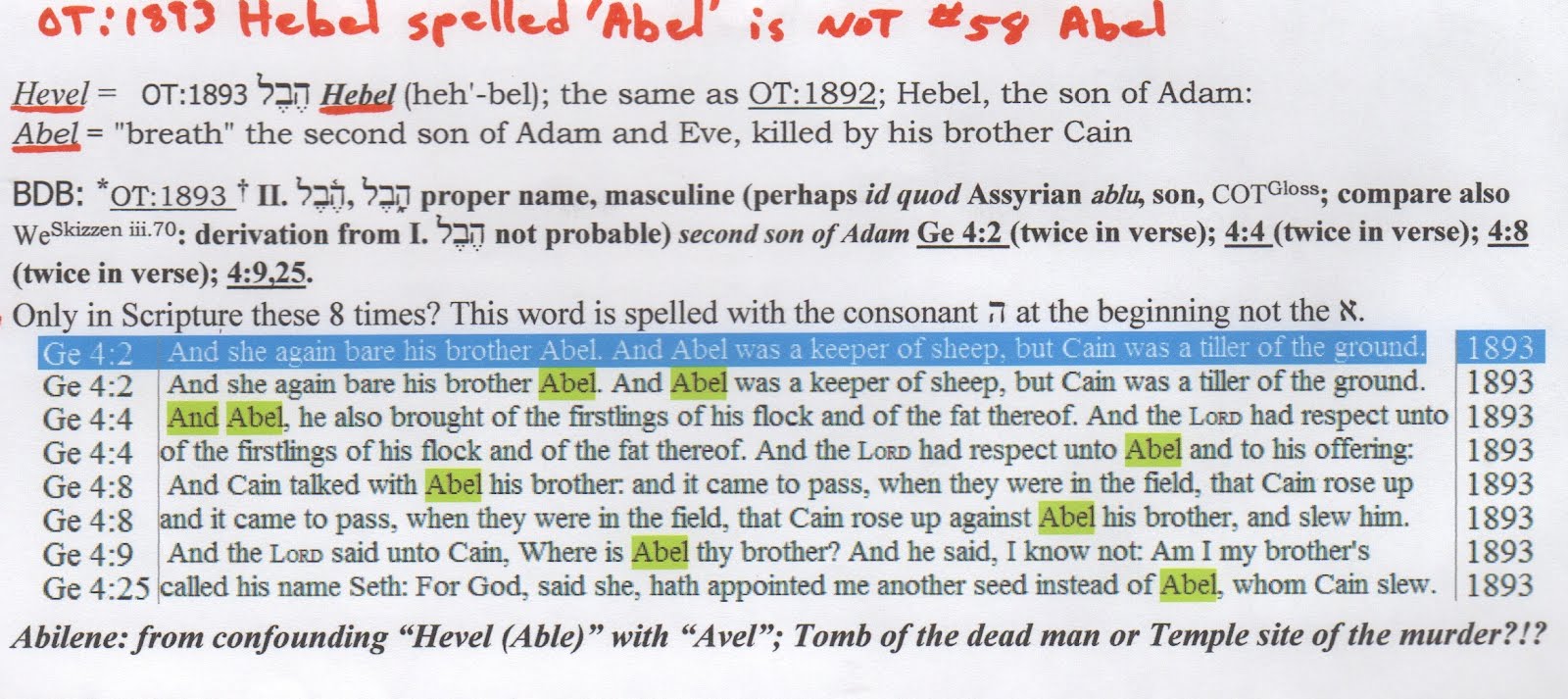
What Mr. Hawkins has done is to take the word ‘Abel’, #H58, and mix it with the name, ‘Havel’, #H1893 and try to impress into the minds of his readers that the city which has the Hebrew letters, אבל aleph-bath-lamed, which means: grassy meadow, is somehow intertwined with the name Havel, הבל ‘heh-bath-lamed’, which he forms into these named cities found in the biblical texts! If you were to read his booklet “The House of Yahweh Established”, where he spends 4 or 5 pages misinterpreting Hebrew root words, Strong’s Concordance, and Hebrew English Lexicons, (which this reviewer has found his abnormal process in attempts to translate scripture), you will find an elementary attempt to prove his point about the word ‘Abilene’. In the resource books that he uses, Mr. Hawkins picks and chooses the definitions he wants, with total disregard to their context within the scripture used, and in my opinion it is not worthy to even take the time to go through all his mistakes. If you start with a mistake, everything else that follows suit, is a mistake! Instead, it would be easier to reveal in this review, the proper definition and context within biblical text, using solid factual historical and biblical information to reveal the meaning of the words: Abilene, Abel, Havel. So we will examine one word by which he starts his readers down the rabbit hole. It is taken from “The Book of Yahweh Study Guide, by Yisrayl Hawkins page 12, concerning the interpretation of the word, Abilene, and his translation of the information from Gesenius Hebrew and English Lexicon, translated by Samuel Tregelles, page 7.
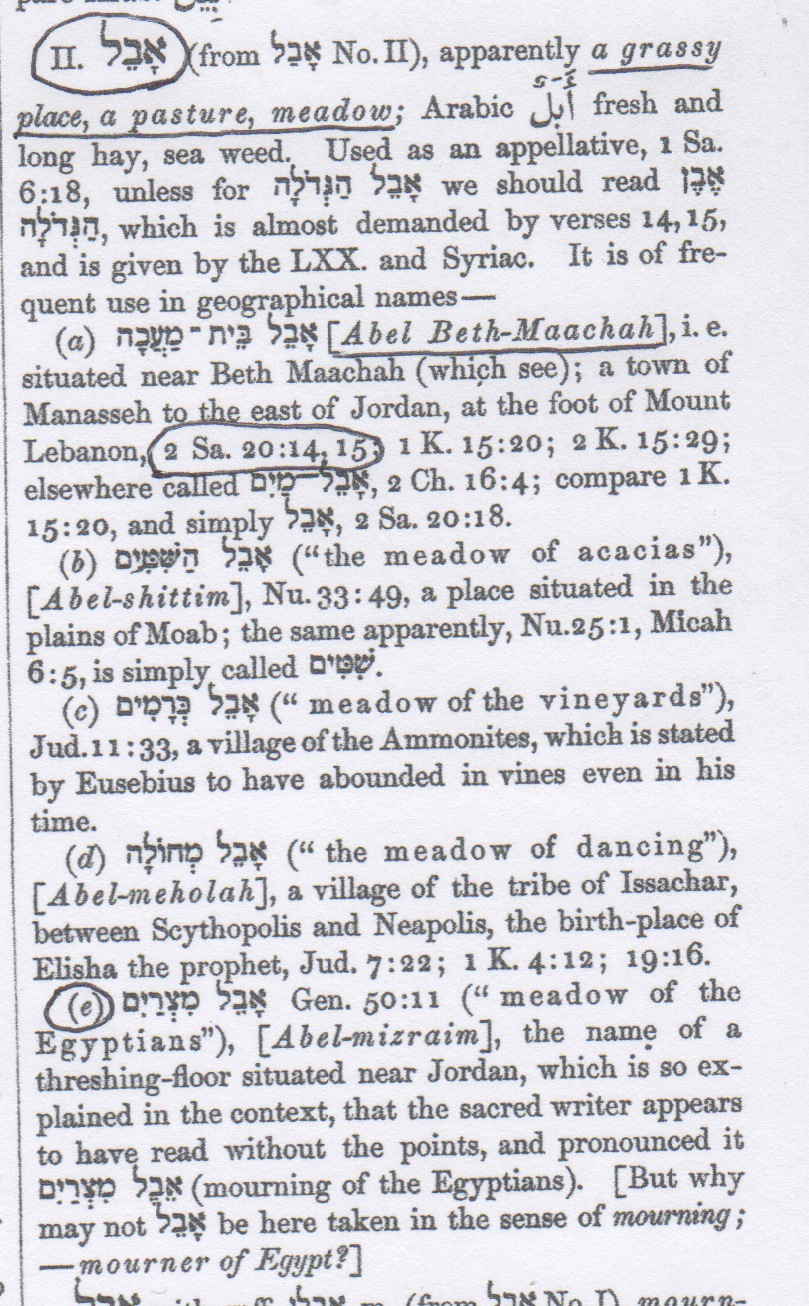

Notice
that he took the definition from subsection (e), to prove his point of the usage of the word, ‘mourning’ as defining the word ‘abel’! This word ‘abel-mizraim’ is used ONLY in reference to this city in Gen. 50:11 and in no other place in scripture. What Mr. Hawkins did was take Strong’s Concordance word #H58 and take the part where it says to: “Comp. also the prop. names beginning with Abel.” That doesn’t mean to the researcher, that if you find the words ‘abel,’ or the words used in conjunction with it, that they will have ANYTHING to do with the Priest, named ‘Abel’, which Gesenius states “It is of frequent use in geographical names.” The Hebrew word, Abel #58 has nothing to do with the Priest, named, ‘Abel’, #H1893! Gesenius is just showing the frequent usage that this word
has with cities containing the prefix, ‘Abel’, or grassy meadow!
Mr. Hawkins also states on page 12 of his book, “I would like for you to note that word #H67 has been translated, ‘meadow of Egypt’… Gesenius, Tregelles translation, page 7…, shows that this word ‘Abel’ should have been translated mourning.” Mr. Hawkins is totally incorrect in his understanding of this statement! The Hebrew and English Lexicon GESENIUS, translated by: Tregelles, page 7, IS NOT EVEN THE CORRECT PAGE OF THE HEBREW WORD USED FOR THE NAME OF ADAM’S SECOND SON!!! That’s on page 214, subsection (3)! Also, word #H67 is a 2 word place name; consisting of #H58 {or #H60}
+ #H4714.

The Hebrew and English Lexicon GESENIUS, translated by: Tregelles, page 7, subsection (e), is about #H58 and is a technical question by this scholar, on the word-play going on which every scholar noted. This word-play regards Genesis 50:11 double statement of the Egyptian’s ‘mourning’ (H:#60, pronounced: ‘abel; as pronounced in English: ‘A bill’ from a creditor) and the name ‘meadow’ (H:58, pronounced: aw-bal; as pronounced in English: ‘a bail’- out from a creditor). It is thought ‘meadow of the
Egyptians’ was used because the Hebrews believed it unholy to give the dead any special importance in order to avoid accidental worship of the dead, and this
scripture is in Hebrew. This particular scholar was questioning this back in the 1800’s because it was not a known fact that the Masoretic vowel points were only to preserve pronunciation and the level these particular peoples’ aversion to uplifting places of the deceased, was also being questioned. This scholar’s question does not in any way, shape, or form imply an added definition or translation to this word #H58! Gesenius merely questions “why” it can’t be the word H#60 which he’d defined as ‘mourning’ under [Homonym] No. I, located at the top of column 2 [‘a-bel, #H60] which, in turn, is from the verb #H56 [Homonym] I, located in the first column of this same page. on page 7 of Tregelles translation, shown below:
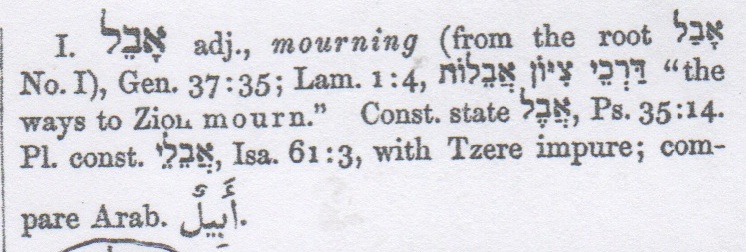
This is what the scholar himself mentions in the 2nd paragraph under subsection (e) on page 7 of this same work; stating categorically: “(from אבל No.I)”!!!
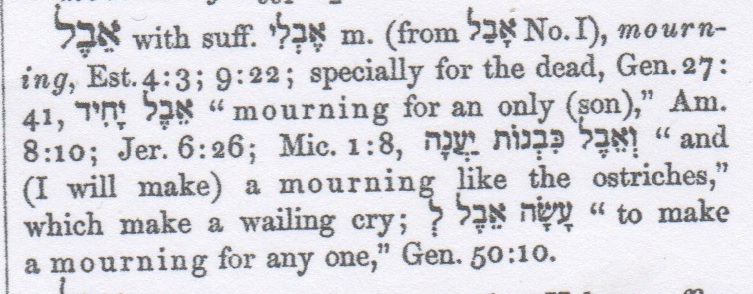
THIS WORD #H58, IN GENESIS 50:11 CANNOT BE GIVEN AN ADDED DEFINITION OF “mourning” and it hasn’t been changed to word #H60 by Gesenius, translated by Tregelles, Robinson, or any other scholar! Although some scholars are still in debate, Mr. Hawkins uses this debate in his book to ADD the definition of word #H60 to #H58 without actually changing to #H60! Or Mr. Hawkins is making up a non-existing Hebrew word which has BOTH definitions of “mourning” and “(watered meadow)”. Either way is in error! Mr. Hawkins seems to believe that by simply removing the Masoretic vowel points the Hebrew language can then be made into his own personal alphabet soup to be rearranged as he sees fit!
If you look at the definition from The Hebrew and English Lexicon GESENIUS, translated by: Tregelles, page 7, shown above, under sub-sections (a,b,c,d,e), you will see the definition for the word ‘Abel’, is used in all these cities names; ‘abel’ which means: “a grassy place, a pasture, meadow.” THAT IS THE DEFINITION FOR THE WORD ‘ABEL’, Strong’s #H58!
If you go to Strong’s Concordance and look up the name ‘Abel’, as shown in (Matt. 23:35, Luke 11:51, Heb. 11:4 and Heb. 12:24) you will find it to be the word: #G6 Habel–; of Hebrew origin {OT:1893}; Abel, the son of Adam!

Notice that the word Abel, is of Hebrew origin! However, Mr. Hawkins doesn’t reveal to the reader this definition from Strong’s Concordance, because the word Abel, is not the root word for Abilene, and is not used in Luke 3:1!
In The Book of Yahweh Study Guide, by Yisrayl Hawkins page 11, we find the following information concerning the word Abilene:
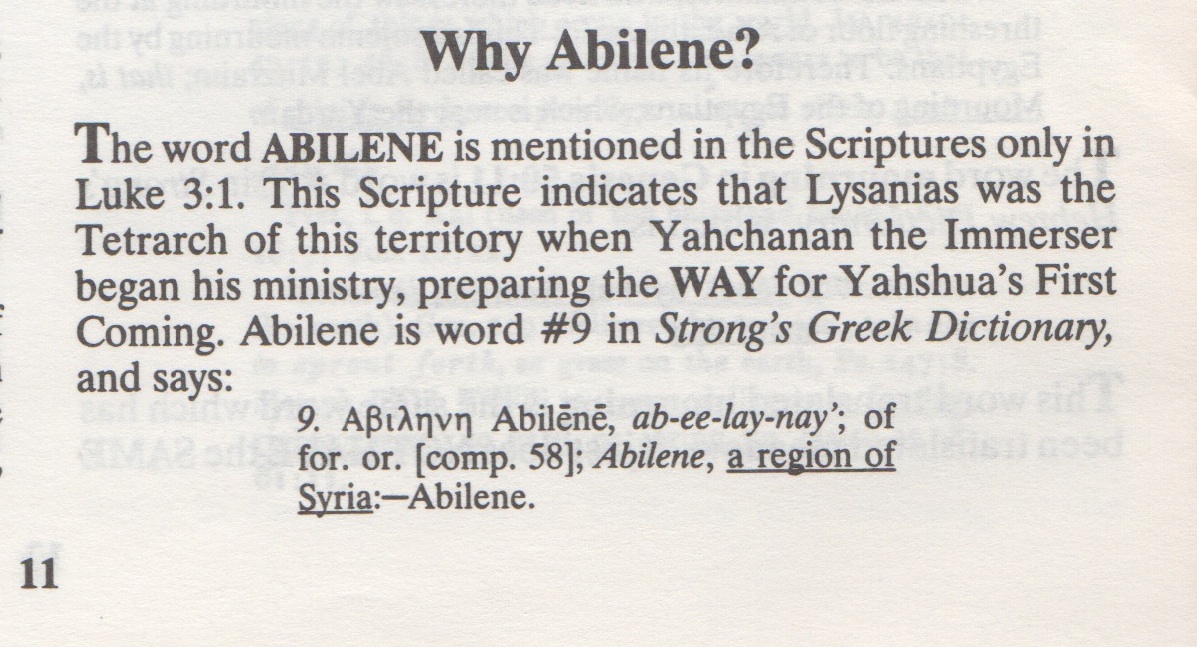
Notice”
that the word: ‘Abilene,’ is of foreign origin and Strong’s tells the reader to [compare #H58]. That is because the word ‘Abilene’ is not a Hebrew word!!! Also note that it is a region of Syria! Abilene was never in Israel and was a foreign region! With this knowledge, would any serious bible student actually think that Yahshua went to a foreign nation, such as Syria to inquire, or learn, of Yahweh, and in a territory located in Syria, that did not worship Yahweh! Let’s
continue our study of this Abilene, Syria!
IS
ABILENE A HOLY PLACE OR OF SPECIAL IMPORTANCE TO YAHWEH?
Informationfrom Fausset’s Bible Dictionary, under Abila, has the followinginformation about Abilene, the tetrarchy of Lysanias.
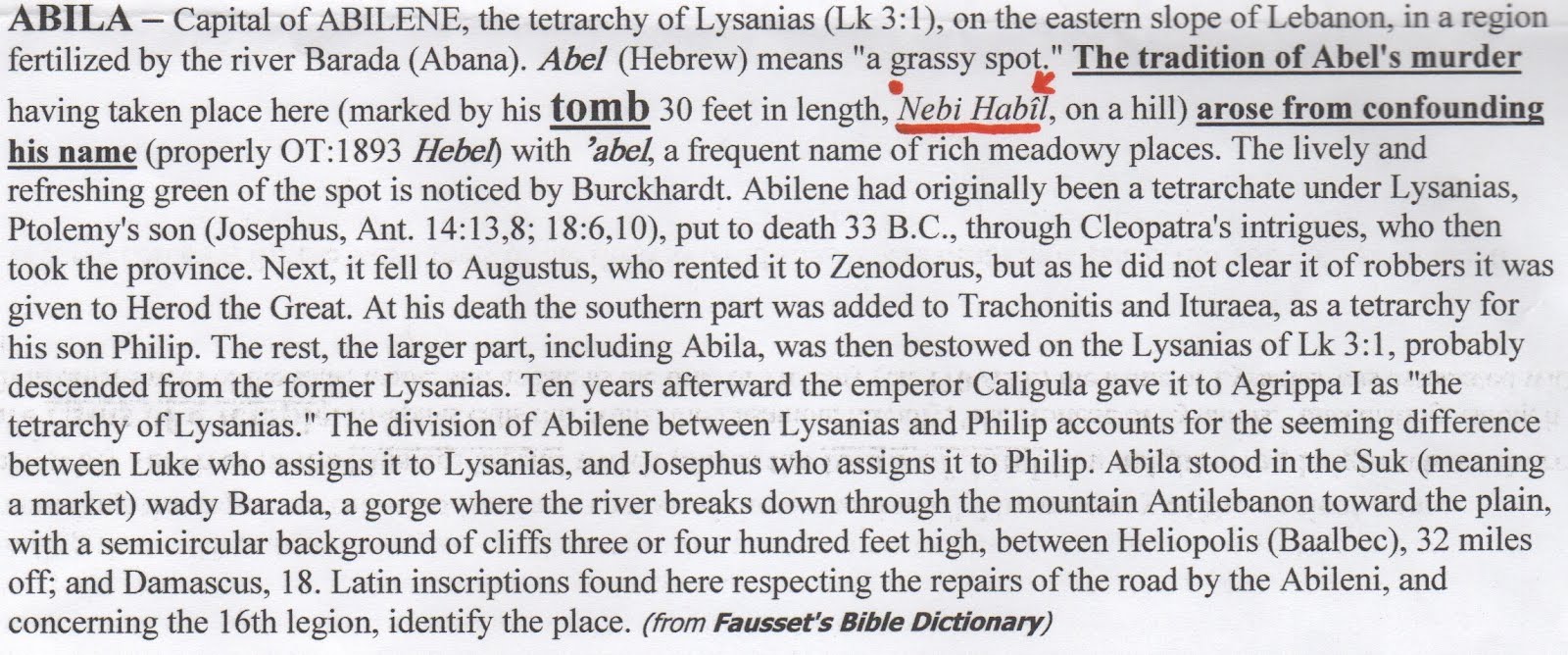
More
information about the region of Abilene, Syria in Yahshua’s time:
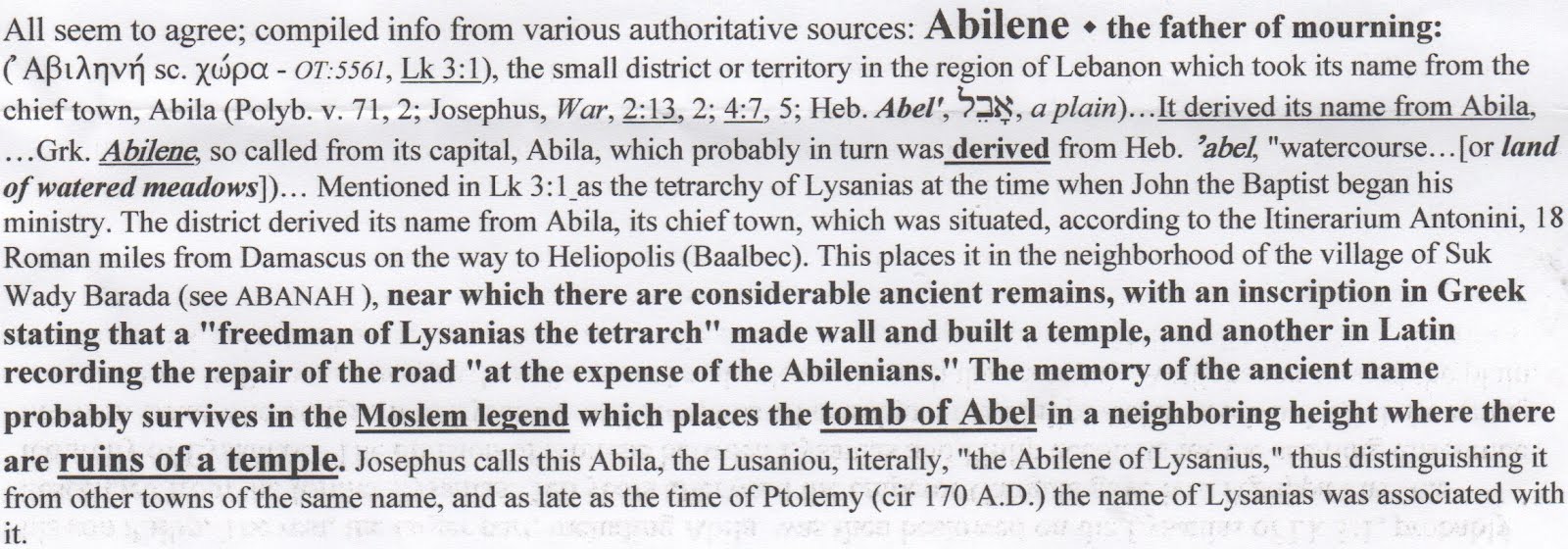
Notice:
Fausset’s Dictionary states: “The tradition of Abel’s murder having taken place here (marked by his TOMB 30 feet in length, Nebi Habil, on a hill) arose from confounding his name (properly OT: #H1893 Hebel) with ‘abel, a frequent name of rich meadowy places.”
Also this dictionary states that the memory of the ancient name probably survives in the Moslem legend, which places the tomb of Abel in a neighboring height where there are ruins of a temple! These legends connecting Abilene with the Priest named Abel, are spurious!
It is not common for the worshippers of the dead to build sites or temples where death took place. No emphasis or mention, can be found in the
biblical text of the Priest, Abel, having a city named after him! In fact this would be against the Hebrew traditions of honoring the dead in such a way, as the heathen nations did. There is no record of any city being named after dead Priests of Yahweh! “Learn not the way of the heathen,” this
was the prophet Yeremyah’s message!
Below is a map of Abilene, Syria! This was the region of Abilene in Yahshua’s day!
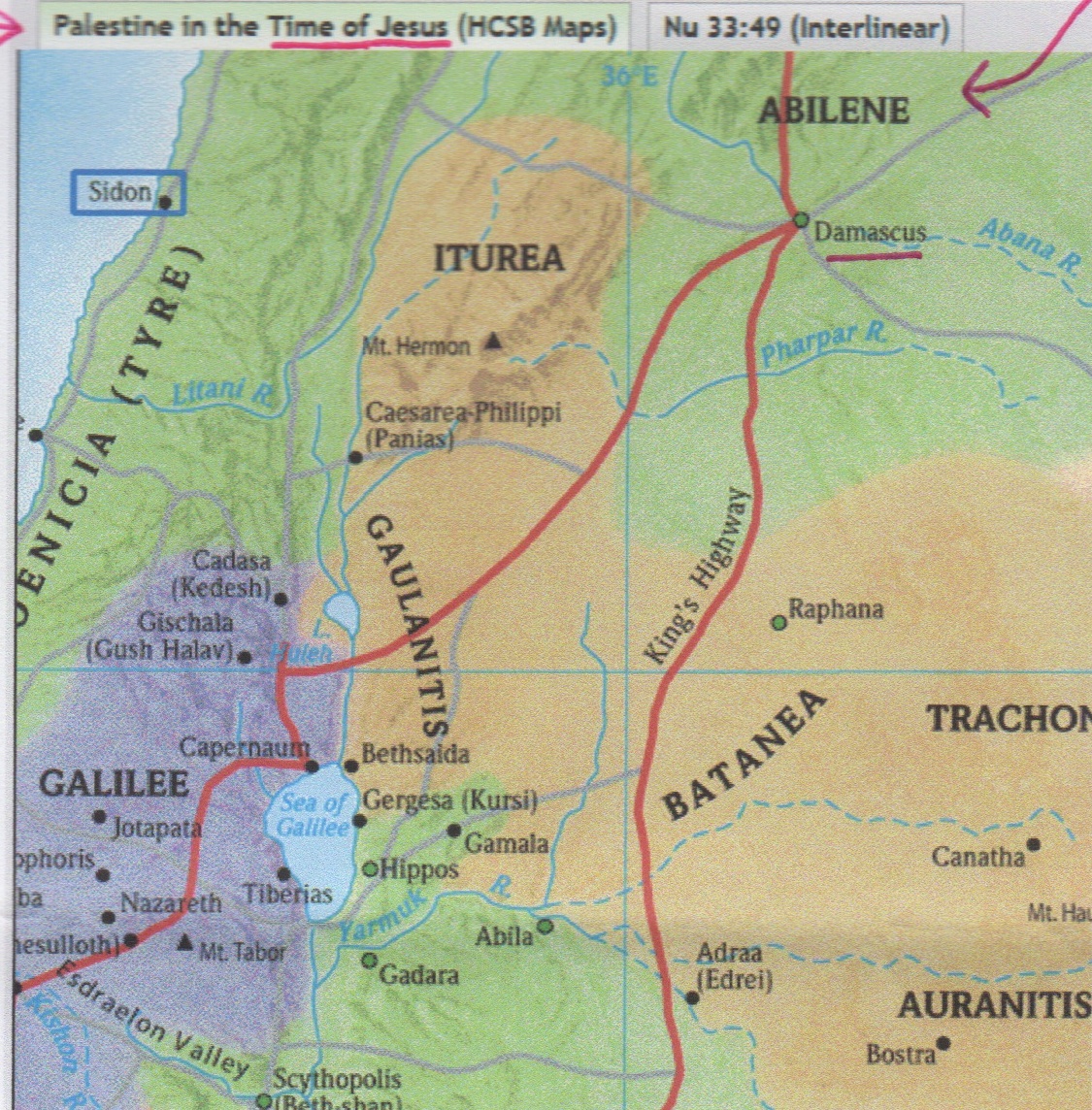
Notice Abilene is above Damascus, Syria. There is no evidence that Yahshua ever went to the region of Abilene, and the only reason it is mentioned in the biblical text, it seems is to verify who the tetrarch of Abilene was, as Luke 3:1 states.
Luke
3:1 “Now in the fifteenth year of the reign of Tiberius Caesar, when Pontius Pilate was governor of Yahdah, Herod was tetrarch of Galilee, his brother Philip was tetrarch of the region Ituraea and Trachonitis, Lysania was tetrarch of Abilene.”
Tetrarch
is defined as: As the name indicates it signifies a prince, who governs one-fourth of a domain or kingdom.
So what we see in Luke 3:1 is a written record of who the Roman princes, governors, and leaders of the government were; we are told of their offices, and regions served, in the time period when Yahchanan (John) was starting his ministry, preparing the way for Yahshua. In fact, we are given even more information concerning who the rulers were in Yahudah and Yerusalem.
Luke
3:2 “And Chananyah and Caiaphas in the High
Priesthood…”
There is no indication from scripture, that the Abilene region in Syria, had any significant importance. There is no biblical text or historical facts that back up
any theory of Abilene, Syria being named after the Priest, Abel. There is no record of any towns named after Aaron, Phinehas, Eli, Mosheh, Samuel, Yahshua, Isayah, Yeremyah, or any prophet or priest of Yahweh. This is the way of the Hebrew faith, according to the Torah, “do not honor the dead!” Yet, Mr. Hawkins
wants his followers to believe that they are to go to Abilene Texas, named after an ancient, biblical city located in Syria, and that somehow these towns named Abilene, are prophetically special, and tied together!
CONCLUSION
This is the fourth review of Mr. Hawkins doctrines, and while this is not a complete dissection of the many mistranslations that run rampant in “The House of Yahweh Established” booklet by Mr. Hawkins, it goes right to the heart of his deception concerning his interpretation and translation of the word, “Abilene.”
Mr. Hawkins starts out building his ‘Abilene,’ doctrinal foundation on sand, so how can anything exegetical, be expected to stand any rock solid analysis, and critique, when using simple biblical research principles. Even if he would just read, learn, and use the Strong’s Concordance correctly, it would suffice him greatly. But alas, he has taken another study and completely vexed this bible student, this time on the word Abilene! He has built a false dogma of such perplexity which has not been seen in the religious world for quite some time!
In this translation of the word ‘Abilene’, he has attempted to tie the Greek word, Abilene, a word of foreign origin to the Hebrew word Abel, and Havel. He weaves his readers through a maze of concordance, lexicon, and scholarly definitions, drawn on for so long, that I would be willing to bet that there is no one at His church, who could logically explain this fiasco of lexical and definitive, wordplay. While if I had time, I would have liked to tackle every blunder in this booklet, and Yahweh willing in the near future, I just might delve further into Mr. Hawkins wonderland, at this time, the core of his Abilene apple is rotten and that is all that needs to be exposed, THE CORE!
Knowing his life history, better than most, I find this work in translation, parallels his own life in so many ways, “confusion.” In real life Buffalo Bill Yisrayl Hawkins has killed his brother Jacob Hawkins work, which started in Odessa, Texas, and through deception, stole the name, HOUSE OF YAHWEH, which he incorporated and copyrighted! When his brother physically died, he didn’t waste much time in making sure that Jacob’s sons incorporated their House of Yahweh, which after a few years closed down for business. However, it has been brought to my attention that some of Jacob Hawkins sons still follow the Law and Prophets writings, so in essence his work is still alive.
Just like the first righteous Priest Abel, whose work was killed off, so Mr. Hawkins has done a thorough job of killing off the HOUSE OF YAHWEH in Odessa, Texas. And he has made a thorough job of killing off the righteous saints who entered his corporate church, called HOUSE OF YAHWEH, who thought they were entering a true House of Yahweh, which they thought was built on the Law and Prophets writings. Those who are the true House of Yahweh, and who came to his church, have been conned by his theme of: Ask at Abel, Ask of Abel at Abel, and taught that the location of Abilene, Texas is the place where Yahweh has established his name in this time period. They should, after reading this short review, now be able to see the trees from the forest! Fact is always truer than fiction! Truth always beats out deception. All seekers of truth, who came to Mr. Hawkins church, should realize after this simple study, that Biblical Abilene, was a Syrian region, not an Israelite region! Why would Yahweh want to place His name, or His House, at a place that is named after a dead Priest, or a place named in a Syrian territory?
Abilene, Texas was named after a sister cow town, called Abilene, Kansas, which was named after a New Testament Region in Syria, called Abilene! It is as simple as that! No hidden scriptures, no spectacular revealings, no hidden messages in words! Just plain old simple readings of Hebrew words, properly using Strong’s and Gesenius to prove simple words that reveal how Mr. Hawkins has turned his word playing, into his own special “ole time religion.” This is reminiscent of the same type of characters that the Apostles had to contend with in their day, which they called “false prophets!”
I’m sure Mrs. Eliza Hersey when she named the town of Abilene, Kansas had good intentions when she named the city in Kansas, after a place that she read about in her Holy Bible. In fact, we find many towns in America, named after cities in the bible. She was most likely a good, christian lady. But she didn’t do anything prophetic, she just had good intentions and biblical principles. I am sure when Mr. Hawkins gets this information, he and his false prophets will get to work, to make something special of this information for his congregation. Or maybe like all the other reviews of his translations, he will ignore the truth and hope it goes away! Time is on my side, and time will reveal if I am truthful, or if Mr. Hawkins is deceiving! Right now my bet is on the truth! We will both stand before our maker and have to answer for everything done in darkness and in light! Mr. Hawkins knows that I am not, nor ever been on his team of yes men, and has underestimated the power of Yahweh! I guarantee these reviews could not be done without the power of Yahweh! I am not capable of doing such a thing by my own power, or I would have done this 25 years ago! One thing is for sure, other researchers have figured out his mistranslations, and have realized it doesn’t take too much research, to find his simple mistakes. Proper understanding in using Strong’s Concordance and Gesenius Lexicon, is required for the truth seeking bible student to come to the realization of just how scripturally ignorant Mr. Hawkins writings are! I am thankful to Yahweh for opening my eyes to these major mistakes in biblical research by Mr. Hawkins and find the future quite promising! Solomon wrote: “To everything there is a time under heaven, a
time to remain silent, and a time to speak up!” Now is the time to speak up, after being silent for so long.
Romans 16:17,18
“Brothers and sisters, I urge you to watch out for those people who create divisions and who make others fall away by teaching doctrine that is not the same as you have learned. Stay away from them. People like these are not serving Yeshua Messiah. They are serving their own desires. By their smooth talk andflattering words they deceive unsuspecting people.”
As you have seen from this review, Mr. Hawkins has convinced himself and others to follow his unorthodox translation style, where he picks and chooses the words he needs to complete his biblical theories. He has convinced many in the past 30 years, that he is the greatest teacher in the world! I think these reviews being done of Mr. Hawkins work, may not convince many in his church to see the truth; I say that because I have not received any replies to my previous
reviews of his mistranslations. However, I believe it will help the serious bible student, those who have not entered his church, to thoroughly examine his
writings! I did this by testing, comparing, evaluating and interpreting the biblical words he uses, as well as his interpretation of these words, and found him to be incorrect and misleading!
In closing, I came to a corporate House of Yahweh many years ago, and now consider myself a true House of Yahweh, according to scripture, (I Cor. 3:16,17). I entered the corporate HOUSE OF YAHWEH, 25 years ago, in Abilene, Texas and am not a part of this deceptive corporation, which is according to scripture (2 Cor. 6:16)! While, for many years, I did fall for Yisrayl Hawkins smooth talk and flattering words, I also held fast to the doctrines that was taught to me
in my youth, which I learned from my mother’s admonition. I was taught from a young man to keep the Laws and Prophets writings, and having repented and returned to my first love, the word of Yahweh, not the word of Yisrayl Hawkins, I Praise Yahweh for His mercy and may He show the same to the true brothers and sisters, some who are still trapped in the spiritual prison, called HOUSE OF YAHWEH in ABILENE, TEXAS and those who are scattered throughout the earth.
BELOW IS A LINK TO A LONG LIST OF FAILED/FALSE PROPHECIES GIVEN BY YISRAYL HAWKINS:
http://www.orgsites.com/tx/yahwehs-people/index.html